专升本英语中的常考介词(一)
专升本英语高频词汇
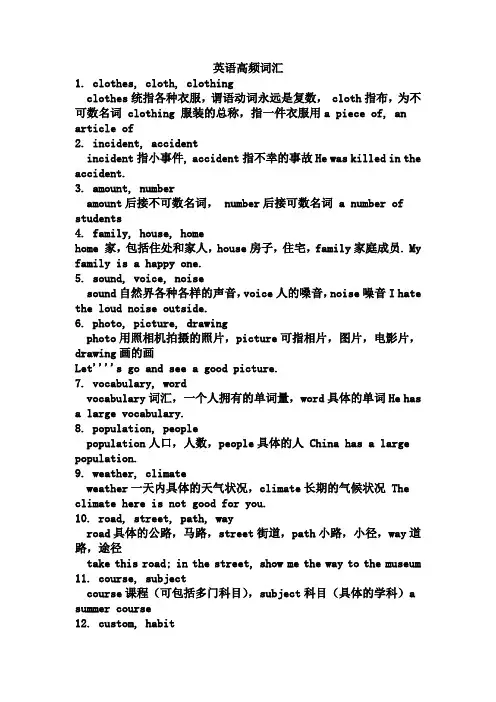
英语高频词汇1. clothes, cloth, clothingclothes统指各种衣服,谓语动词永远是复数, cloth指布,为不可数名词 clothing 服装的总称,指一件衣服用a piece of, an article of2. incident, accidentincident指小事件, accident指不幸的事故He was killed in the accident.3. amount, numberamount后接不可数名词, number后接可数名词 a number of students4. family, house, homehome 家,包括住处和家人,house房子,住宅,family家庭成员. My family is a happy one.5. sound, voice, noisesound自然界各种各样的声音,voice人的嗓音,noise噪音I hate the loud noise outside.6. photo, picture, drawingphoto用照相机拍摄的照片,picture可指相片,图片,电影片,drawing画的画Let''''s go and see a good picture.7. vocabulary, wordvocabulary词汇,一个人拥有的单词量,word具体的单词He hasa large vocabulary.8. population, peoplepopulation人口,人数,people具体的人 China has a large population.9. weather, climateweather一天内具体的天气状况,climate长期的气候状况 The climate here is not good for you.10. road, street, path, wayroad具体的公路,马路,street街道,path小路,小径,way道路,途径take this road; in the street, show me the way to the museum 11. course, subjectcourse课程(可包括多门科目),subject科目(具体的学科)a summer course12. custom, habitcustom传统风俗,习俗,也可指生活习惯,后接to do, habit 生活习惯,习惯成自然,后接of doing. I''''ve got the habit of drinking a lot.13. cause, reasoncause 指造成某一事实或现象的直接原因,后接of sth./doing sth,reason用来解释某种现象或结果的理由,后接for sth./doing sth. the reason for being late14. exercise, exercises, practiceexercise运动,锻炼(不可数),exercises练习(可数),practice (反复做的)练习Practice makes perfect.15. class, lesson作"课"解时,两者可以替换.指课文用lesson. 指班级或全体学生用class. lesson 6; class 516. speech, talk, lecturespeech指在公共场所所做的经过准备的较正式的演说,talk日常生活中的一般的谈话,讲话,lecture学术性的演讲,讲课 a series of lecture on…17. officer, officialofficer部队的军官,official政府官员 an army officer18. work, job二者均指工作。
专升本英语语法与词汇知识点总结
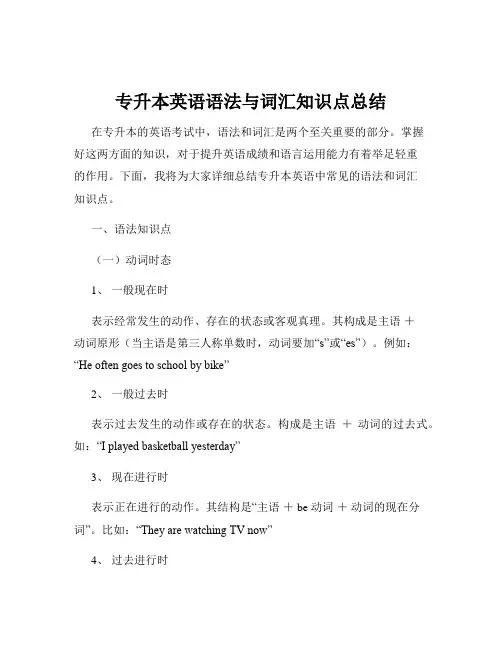
专升本英语语法与词汇知识点总结在专升本的英语考试中,语法和词汇是两个至关重要的部分。
掌握好这两方面的知识,对于提升英语成绩和语言运用能力有着举足轻重的作用。
下面,我将为大家详细总结专升本英语中常见的语法和词汇知识点。
一、语法知识点(一)动词时态1、一般现在时表示经常发生的动作、存在的状态或客观真理。
其构成是主语+动词原形(当主语是第三人称单数时,动词要加“s”或“es”)。
例如:“He often goes to school by bike”2、一般过去时表示过去发生的动作或存在的状态。
构成是主语+动词的过去式。
如:“I played basketball yesterday”3、现在进行时表示正在进行的动作。
其结构是“主语+ be 动词+动词的现在分词”。
比如:“They are watching TV now”4、过去进行时强调过去某个时间正在进行的动作,形式为“主语+ was/were +动词的现在分词”。
像:“I was reading a book at that time”5、现在完成时表示过去发生的动作对现在造成的影响或结果,或者从过去开始一直持续到现在的动作。
其构成是“主语+ have/has +过去分词”。
例如:“She has learned English for five years”6、过去完成时表示过去某个时间之前已经完成的动作,结构是“主语+ had +过去分词”。
比如:“By the end of last year, we had learned 2000 words”(二)语态1、主动语态主语是动作的执行者。
例如:“He opened the door”2、被动语态主语是动作的承受者,构成是“be +过去分词”。
如:“The door was opened by him”(三)非谓语动词1、动词不定式具有名词、形容词和副词的特征,可作主语、宾语、定语、状语等。
专升本英语介词、连词基础用法速记
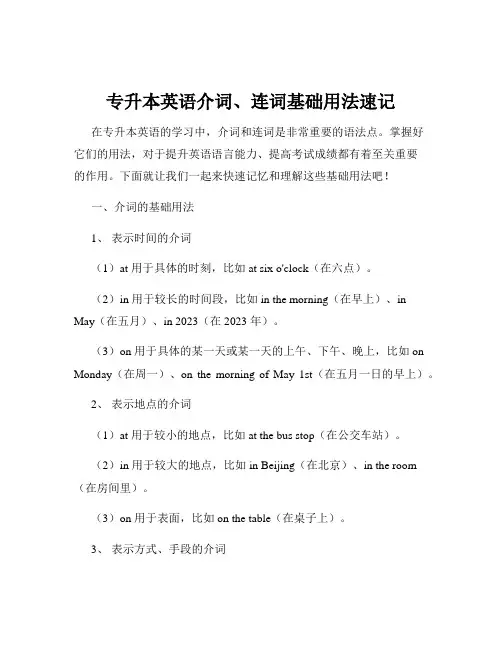
专升本英语介词、连词基础用法速记在专升本英语的学习中,介词和连词是非常重要的语法点。
掌握好它们的用法,对于提升英语语言能力、提高考试成绩都有着至关重要的作用。
下面就让我们一起来快速记忆和理解这些基础用法吧!一、介词的基础用法1、表示时间的介词(1)at 用于具体的时刻,比如 at six o'clock(在六点)。
(2)in 用于较长的时间段,比如 in the morning(在早上)、inMay(在五月)、in 2023(在 2023 年)。
(3)on 用于具体的某一天或某一天的上午、下午、晚上,比如 on Monday(在周一)、on the morning of May 1st(在五月一日的早上)。
2、表示地点的介词(1)at 用于较小的地点,比如 at the bus stop(在公交车站)。
(2)in 用于较大的地点,比如 in Beijing(在北京)、in the room (在房间里)。
(3)on 用于表面,比如 on the table(在桌子上)。
3、表示方式、手段的介词(1)by 表示通过某种方式,比如 by bus(乘公交车)、by hand(用手)。
(2)with 表示用某种工具,比如 with a pen(用一支笔)。
(3)in 表示用某种语言或材料,比如 in English(用英语)、in ink (用墨水)。
4、其他常见的介词用法(1)about 表示关于,比如 talk about(谈论关于)。
(2)for 表示为了、给,比如 buy a gift for her(给她买一份礼物)。
(3)of 表示的,比如 a map of China(一张中国地图)。
(4)from 表示从,比如 come from China(来自中国)。
(5)to 表示到,比如 go to school(去上学)。
二、连词的基础用法1、并列连词(1)and 表示并列、顺承关系,比如 He is tall and handsome(他又高又帅。
安徽省普通高等学校专升本招生考试主要英语语法复习
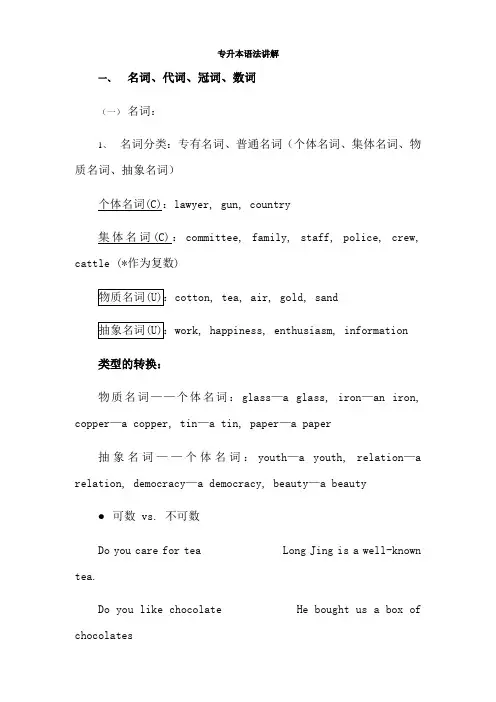
专升本语法讲解一、名词、代词、冠词、数词(一)名词:1、名词分类:专有名词、普通名词(个体名词、集体名词、物质名词、抽象名词)个体名词(C):lawyer, gun, country集体名词(C):committee, family, staff, police, crew, cattle (*作为复数)cotton, tea, air, gold, sandwork, happiness, enthusiasm, information 类型的转换:物质名词——个体名词:glass—a glass, iron—an iron, copper—a copper, tin—a tin, paper—a paper抽象名词——个体名词:youth—a youth, relation—a relation, democracy—a democracy, beauty—a beauty 可数 vs. 不可数Do you care for tea Long Jing is a well-known tea.Do you like chocolate He bought us a box of chocolatesHave some coffee. Two coffees, please.●不可数名词的量A piece of news/ advice/ information/ work…A bottle of milk/ ink…2、名词的数:单数、复数特殊的名词复数:●以“O”结尾,不加es的: 末尾为两个元音字母;外来词:radios, bamboos, zoos; photos, pianos, memos, tobaccos●以“f/fe”结尾,直接加es的:Roofs, cliffs, proofs, hoofs, chiefs, gulfs,beliefs●不规则形式:英语中古的复数形式;外来词Man-men, tooth—teeth, child-children, ox-oxenPhenomenon-phenomena, thesis-theses, crisis-crises, criterion-criteria●单复数同形:Chinese, Japanese, aircraft, sheep, deer, fish, swine, means, series, species…●合成名词的复数:只把主体名词改为复数:looker(s)-on, runner(s)-on, son(s)-in-law由man/woman构成的合成名词,全部都变:man-servant—men-servants, woman doctor—women doctors●常以复数形式出现的:两部分构成的;以-ing结尾的;其他Scissors, trousers, glasses, pants…Belongings, surroundings, savings, findings…Statistics, overalls, congratulations, clothes, stairs●以-s为词尾,但做单数看的词:Phonetics, politics, physics3. 名词的格:’s; “of”4. 名词在句中的作用:作主语、宾语、表语、定语、补语等●主语:Complacency is the enemy of study.●表语:We are all servants of the people.●宾语:He knows five languages.●定语:Is it a colour TV●补语:We elected him our monitor.二、代词:人称代词、物主代词、自身代词、相互代词、指示代词、疑问代词、关系代词、连接代词、不定代词1、人称代词、物主代词、自身代词2、相互代词:one another, each otherWe can help one another (each other).3、指示代词:this, that, these, those●指前面提到的事物:that, those (避免重复)The best coal is that from Newcastle.These machines are better than those we turned out last year.●*如果名词是单数可数名词,用the one更多I’ll take the seat next to the one by the window.My room is lighter than the one next door.●指下面要说的事物:this, theseI want to know this: Has John been here●Such: 作定语、主语、表语We have has such a busy day.Such are the results.His illness was not such as to cause anxiety.4. 疑问代词:who, whom, whose, what, which5.关系代词:引起定语从句who, whom, whose, that, which, (such…) as6.连接代词:引起主语从句、宾语从句、表语从句(所有的疑问代词、what)7、不定代词:all, each, every, both, either, neither, one, none, little, few, many, much, other another, some, any, no 及由some, any, no, every构成的合成代词。
英语的基础介词
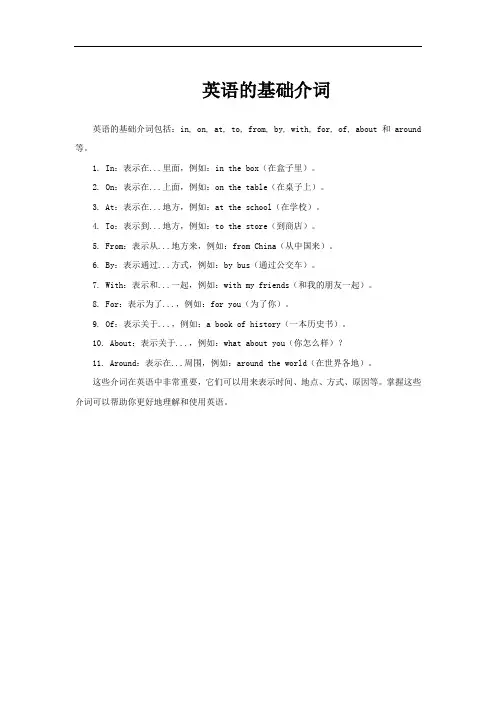
英语的基础介词
英语的基础介词包括:in, on, at, to, from, by, with, for, of, about 和 around 等。
1. In:表示在...里面,例如:in the box(在盒子里)。
2. On:表示在...上面,例如:on the table(在桌子上)。
3. At:表示在...地方,例如:at the school(在学校)。
4. To:表示到...地方,例如:to the store(到商店)。
5. From:表示从...地方来,例如:from China(从中国来)。
6. By:表示通过...方式,例如:by bus(通过公交车)。
7. With:表示和...一起,例如:with my friends(和我的朋友一起)。
8. For:表示为了...,例如:for you(为了你)。
9. Of:表示关于...,例如:a book of history(一本历史书)。
10. About:表示关于...,例如:what about you(你怎么样)?
11. Around:表示在...周围,例如:around the world(在世界各地)。
这些介词在英语中非常重要,它们可以用来表示时间、地点、方式、原因等。
掌握这些介词可以帮助你更好地理解和使用英语。
专升本英语常考词汇
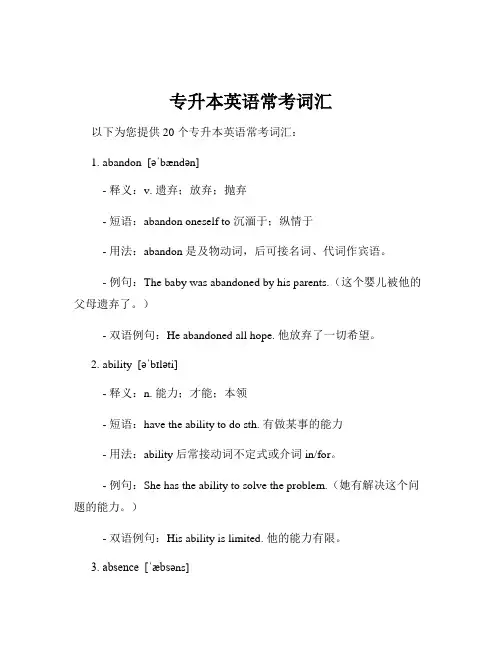
专升本英语常考词汇以下为您提供 20 个专升本英语常考词汇:1. abandon [əˈbændən]- 释义:v. 遗弃;放弃;抛弃- 短语:abandon oneself to 沉湎于;纵情于- 用法:abandon 是及物动词,后可接名词、代词作宾语。
- 例句:The baby was abandoned by his parents.(这个婴儿被他的父母遗弃了。
)- 双语例句:He abandoned all hope. 他放弃了一切希望。
2. ability [əˈbɪləti]- 释义:n. 能力;才能;本领- 短语:have the ability to do sth. 有做某事的能力- 用法:ability 后常接动词不定式或介词 in/for。
- 例句:She has the ability to solve the problem.(她有解决这个问题的能力。
)- 双语例句:His ability is limited. 他的能力有限。
3. absence [ˈæbsəns]- 释义:n. 缺席;不在;缺乏- 短语:in the absence of 在…不在时;缺乏…时- 用法:absence 常与介词 from 连用。
- 例句:His absence from the meeting was noticed.(他未出席会议被注意到了。
)- 双语例句:Absence makes the heart grow fonder. 久别情更深。
4. absolute [ˈæbsəluːt]- 释义:adj. 绝对的;完全的;专制的- 短语:absolute power 绝对权力- 用法:absolute 作定语,修饰名词。
- 例句:This is an absolute truth.(这是一个绝对的真理。
)- 双语例句:The law is absolute. 法律是绝对的。
专升本英语介词和连词PPT
知识网络
介词
• 介词又叫前置词,是一种虚词。介词分为三种, 一种是简单介词,如at, in, on, beside, to , for等; 另一种是短语介词,即由两个以上的词组组成的 短语,如in front of, because of, out of, instead of 等;还有一种叫二重介词,如until after, from behind等
• Beijing held the Olympic Games in 2008.
• 北京2008年举办了奥运会。
• on强调“日”和某日的早、中、晚。 • on总是跟日子有关,on Monday, on Christmas
morning, on the following, on May Day, on a warm morning等
at, in, on
• at强调“点” • at表示片刻的时间,如:at 8 o’clock ,常用
词组有:at noon, at night, at midnight, at the end of, at that time, at the beginning of, at the age of, at Christmas, at New Year等。
倒装结构:Not until +从句 + 倒装的主句
We did not get off the bus until it stopped.
主句
从句
基本结构: not 主句 + until +从句
Not until 在强调句中的运用
强调句结构:It is/was not until + 从句 +that +主
专升本英语重点归纳总结
第三课1. count on: to rely on;depend on 依靠,依赖You can count on my help.你可以依赖我的帮助4. available adj.可用到的, 可利用的,Chinese commodities available for export are varied.中国可供出口的商品种类繁多。
I'm sorry, those overcoats are not available in your colour and size.对不起,这种外套没有你要的颜色和尺码。
The lawyer is not available now.律师现在没空。
approachable可接近的, 平易近人的, 亲切的You'll find the headmaster a very approachable person.你将会发现校长十分平易近人。
9. recall:回忆, 回想, 记起, 取消Recall the misery of the past and contrast it with the happiness of today."想想过去的苦,比比今天的甜。
" retain:保持, 保留retain an appearance of youth保有年轻的外貌remind:提醒, 使想起Remind me to write to Mother.提醒我给妈妈写信。
This reminds me of last year.这使我想起去年的事。
12. intensively adv.强烈地, 集中地intensive reading 精读intensive farming细耕农业, 集约农业originally adv. 最初, 原先originally named Johnston.他原本名叫庄士顿19. intimate adj. 亲密的, 隐私的an intimate letter.私人信件initial最初的, 词首的, 初始的the initial issue of a magazine杂志的创刊号Incredible难以置信的gave an incredible explanation of thecause of the accident20. look into向...的里面看, 窥视;浏览;观察,调查run into 偶然遇见,偶然发现遭遇,陷入(某件事)ran into an old friend.与一个老朋友不期而遇His net worth runs into seven figures.他的净值达到了七位数come into 继承, 获得(遗产);开始;进入Tom came into a fortune when hisuncle died.汤姆的叔叔去世后,他得到一大笔钱。
专升本-英语高频词汇
一.专升本英语常考词汇第一部分:Unit Onereject vt. 拒绝fatal adj.致命的;重大的fate n.命运humble adj.谦逊的;谦虚的illegal adj.不合法的,非法的award vt.授予,判给 n.奖品,奖金aware adj.意识到column n.柱,圆柱;栏,专栏comedy n.喜剧dumb adj.哑的;沉默的dump vt.倾倒;卸下deaf adj.聋的;不愿听的decorate vt.装饰,装潢principal adj.最重要的 n.负责人,校长principle n.原则,原理prior adj.优先的,在前的priority n.优先,重点prohibit vt.禁止,不准remarkable adj.值得注意的,异常的,非凡的remedy n./vt.补救,医治,治疗repetition n. 重复,反复vain adj.徒劳的,无效的undertake vt.承担,着手做;同意,答应unique adj.唯一的,独特的obstacle n.障碍物,妨碍omit vt.省略opponent n.敌手,对手opportunity n.机会,时机orchestra n.管弦乐队semester n.学期;半年semiconductor n.半导体seminar n. 研讨会terminal adj.末端的,极限的 n.终点territory n.领土approximated adj.大概的,大约 v.近似arbitrary adj.随意的,未断的architect n. 建筑师architecture n.建筑学biology n.生物学geography n.地理学geology n.地质学geometry n.几何学arithmetic n.算术algebra n.代数entertainment n.娱乐;招待,款待enthusiasm n.热情,热心entry n.进入,入口处;参赛的人或物environment n.环境episode n.插曲,片段equation n.方程式restrain vt.阻止,抑制restraint n.抑制,限制resume v.重新开始severe adj.严重的sexual adj.性的simplicity n.简单;朴素simplify vt.简化sorrow n.悲哀,悲痛stuff n.原料,材料 vt.填进,塞满terror n.恐怖thrust v.挤,推,插temporary adj.暂时的,临时的temptation n.诱惑,引诱Unit Twotremendous adj.巨大的;精彩的trend n.趋向,倾向trial n.审讯;实验apparent adj.显然的,明白的appetite n.胃口;欲望deposit n.存款,定金 v.存放,储蓄deputy n.副职,代表derive vt.取得,得到;(from)起源于descend v.下来,下降missile n.导弹mission n.使命;代表团mist n.薄雾noticeable adj.显而易见的notify vt.通知,告知notion n.概念;意图,想法resemble vt.像,类似于reveal vt.揭露revenue n.收入,岁入;税收shelter n.掩蔽处;住所shield n.防护物,盾 vt.保护,防护vital adj.重要的;致命的,生命的vitally ad.极度,非常;致命地urban adj.城市的urge vt.鼓励,激励urgent adj.急迫的,紧急的usage n.使用,用法violence n.强力,暴力violent adj.强暴的violet adj.紫色的weed n.杂草,野草welfare n.福利whatsoever ad.(用于否定句)任何whereas conj.然而,但是,尽管essential adj.必不可少的;本质的estimate n./vt.估计,估量evaluate vt.评估,评价exceed vt.超过,超出exceedingly ad.非常,极其exclaim v.呼喊,大声说exclude vt.把...排斥在外,不包括exclusive adj.独有的,排他的excursion n.远足flash vi.闪光,闪耀flee vi.逃走flexible adj.易弯曲的;灵活的flock n.羊群,一群;一伙人hardware n.五金器具;硬件harmony n.和谐,融洽haste n.急速,急忙hatred n.憎恨,憎恶incident n.事件,事变index n.索引,标志infant n.婴儿infect v.传染inferior adj.劣等的,次的,下级的infinite adj.无限的ingredient n.组成部分inhabitant n.居民jail n.监狱jam n.果酱;拥挤,堵塞jewel n.宝石joint adj.链接的,共同的junior adj.年少的,资历较浅的laser n. 激光launch vt.发动,发起luxury n.奢侈;奢侈品magnet n.磁铁,磁体male adj.男性的,雄的female adj.女性的,雌的manual adj.用手的,手工做的 n.手册manufacture vt./n.制造,加工marine adj.海的;海产的Unit Threetreaty n.条约,约定arise vi.产生,出现,发生;起身arouse vt.引起,激起;唤醒burden n. 重担,负荷bureau n.局,办事处marvelous adj.奇迹般的,惊人的massive adj.大的,大量的,大块的mature adj.成熟的maximum adj.最高的,最大的minimum adj.最低的,最小的nonsense n.胡说,冒失的行动nuclear adj.核子的,核能的nucleus n.核retail n./v./ad. 零售retain vt.保留,保持restrict vt.限制,约束sponsor n.发起者,主办者 vt.发起,主办,赞助spur n./v.刺激,激励triumph n.胜利,成功tuition n.学费twist vt.使缠绕;转动;扭歪undergraduate n.大学肄业生universal adj.普遍的,通用的;宇宙的universe n.宇宙via prep.经由,经过,通过vibrate v.振动,摇摆virus n.病毒voluntary adj.自愿的volunteer n.志愿者 v.自愿做vote n.选票 v.选举wagon n.四轮马车,铁路货车appoint vt.任命,委派approach v.靠近,接近 n.途径,方式appropriate adj.适当的bunch n.群,伙;束,串bundle n.捆,包,束 vt.收集,归拢ceremony n.典礼,仪式chaos n.混乱,紊乱discount n.折扣display n./vt.陈列,展览equivalent adj.相等的 n.相等物erect adj.竖直的 v.建造,竖立fax n./vt.传真fertile adj.肥沃的,多产的fertilizer n.肥料grateful adj.感激的gratitude n.感激horror n.恐怖horrible adj.可怕的internet n.国际互联网,因特网interpret v.翻译,解释interpretation n.解释,说明jungle n.丛林,密林knot n.结 vt.把...打成结leak v.漏,渗出lean vi.倾斜,倚,靠leap vi.跳跃modify vt.修改nylon n.尼龙onion n.洋葱power n.粉末applicable adj.可应用的,适当的applicant n.申请人breadth n.宽度Unit Fouralter v.改变,改动,变更burst v./n.突然发生,爆裂dispose v.除掉;处置;解决;处理blast n.爆炸;气流 vi.炸,炸掉consume v.消耗,耗尽split v.劈开;割裂;分裂 adj.裂开的spit v.吐;唾弃spill v.溢出,溅出,倒出slip v.滑动,滑落;忽略slide v.滑动,滑落 n.滑动;滑面;幻灯片bacteria n.细菌breed n.种,品种 v.繁殖,产仔budget n预算 v.编预算,作安排candidate n.候选人campus n. 校园liberal adj.慷慨的;丰富的;自由的transform v. •转变,变革;变换transmit v.传播,播送;传递transplant vt.移植transport vt.运输,运送 n.运输,运输工具shift v.转移;转动;转变vary v.变化,改变;使多样化vanish vi.消失,不见swallow v.吞下,咽下 n.燕子suspicion n.怀疑,疑心suspicious adj.怀疑的,可疑的mild adj.温暖的,暖和的;温柔的,味淡的tender adj.温柔的;脆弱的nuisance n.损害,妨害,讨厌的人或事物insignificant adj.无意义的,无足轻重的;无价值的accelerate v.加速,促进absolute adj.绝对的,无条件的,完全的boundary n.分界线,边界brake n.刹车,制动器 v.刹住(车)catalog n.目录 v.编目vague adj.模糊的,不明确的vain n.徒劳,白费extinct adj.绝灭的,熄灭的extraordinary adj.不平常的,特别的,非凡的extreme adj.极度的,极端的 n.极端,过分agent n.代理人,代理商;动因,原因alcohol n.含酒精的饮料,酒精appeal n./vi.呼吁,恳求appreciate vt.重视,赏识,欣赏,感激approve v.赞成,同意,批准stimulate vt.刺激,激励acquire vt.取得,获得;学到accomplish vt.完成,到达;实行network n.网状物;广播网,电视网;网络tide n.潮汐;潮流tidy adj.整洁的,整齐的trace vt.追踪,找到 n.痕迹,踪迹torture n./vt.拷打,折磨wander vi.漫游,闲逛wax n.蜡weave v.织,编preserve v.保护,保存,保持,维持abuse v.滥用,虐待;谩骂academic adj.学术的;高等学校的;研究院的academy n.(高等)专科院校;学会battery n.电池barrier n.障碍;界线cargo n.(船,飞机等装载的)货物career n.生涯,职业Unit Fivevessel n.船舶;容器,器皿;血管vertical adj.垂直的oblige v.迫使,责成;使感激obscure adj.阴暗,模糊extent n. 程度,范围,大小,限度exterior n.外部,外表 adj.外部的,外表的external adj.外部的,外表的,外面的petrol n.汽油petroleum n.石油delay vt./n.推迟,延误,耽搁decay v.腐烂,腐朽decent adj.像样的,体面的route n.路;路线;航线ruin v.毁坏,破坏 n.毁灭sake n.缘故,理由satellite n.卫星scale n.大小,规模;等级;刻度temple n.庙宇tedious adj.乏味的,单调的tend vi.易于,趋向tendency n.趋向,趋势ultimate adj.极端的,最大的,最终的 n.极端undergo v.经历,遭受abundant adj.丰富的,充裕的,大量的adopt v.收养;采用;采纳adapt vi.适应,适合;改编,改写 vt.使适应bachelor n.学士,学士学位;单身汉casual adj.偶然的,碰巧的;临时的;非正式的trap n.陷进,圈套 v.设陷阱捕捉vacant adj.空的,未占用的vacuum n.真空,真空吸尘器oral adj. 口头的,口述的,口的optics n.(单,复数同形)光学organ n.器官,风琴excess n.过分,过量,过剩expel v.驱逐,开除,赶出expend vt.消费expenditure n.支出,消费;经费expense n.开销,费用expensive adj.花钱多的;价格高贵的expand v.扩大,扩张;展开,膨胀expansion n.扩大,扩充;发展,膨胀private adj.私人的,个人的individual adj.个别的,单独的 n.个人,个体personal adj.个人的,私人的,亲自的personnel n.人员,员工;人事部门the Pacific Ocean 太平洋the Atlantic Ocean大西洋the Arctic Ocean北冰洋the Antarctic Ocean南冰洋grant vt.授予,同意,准予grand adj.宏伟的,壮丽的,重大的invade v.侵入,侵略,侵袭acid n.酸,酸性物质 adj.酸的;尖刻的acknowledge v.承认;致谢balcony n.阳台calculate vt.计算,核算calendar n.日历,月历optimistic adj.乐观的optional adj.可以任选的,非强制的outstanding adj.杰出的,突出的,显著的export n.出口 v.出口,输出import n.进口 v.进口,输入impose vt.把...加强(on);采用,利用Unit Sixaspect n.方面;朝向;面貌cope vi.(with)(成功地)应付,处理core n.果心,核心maintain vt.维持,保持;坚持,主张mainland n.大陆discipline n.纪律;惩罚;学科domestic adj.本国的,国内的;家用的,家庭的constant adj.不变的,恒定的 n.常数cliff n.悬崖,峭壁authority n.权威;当局audio adj.听觉attitude n.态度community n.社区,社会commit vt.犯(错误,罪行等),干(坏事等)comment n./vt.评论distinguish vt.区分,辨别distress n.痛苦,悲伤 vt.使痛苦facility n.[pl.]设备,设施;便利,方便faculty n.能力,技能;系,学科,学院;全体教员mixture n.混合;混合物mood n.心情,情绪;语气moral adj.道德上的,有道德的prominent adj.突出的substance n.物质;实质substantial adj.可观的;牢固的;实质的prompt vt.促使 adj.敏捷的,及时的vivid adj.生动的vocabulary n.词汇(量);词汇表venture n.风险投资,风险项目 v.冒;取于version n.版本,译本;说法waist n.腰,腰部weld v./n.焊接yawn vi.打哈欠yield vi.(to)屈服于;让出,放弃 n.产量zone n.地区,区域strategy n.战略,策略strategic adj.战略上的;关键的tense adj.紧张的 v.拉紧 n.时态tension n.紧张,张力avenue n.林荫道,大街available adj.现成可用的;可得到的comparable adj.(with, to)可比较的,类似的comparative adj.比较的,相对的dash vi.猛冲,飞奔data n.数据,资料dive vi.跳水,潜水diverse adj.不同的,多种多样的entitle vt.给...权利,给...资格regulate vt.管理,调节release vt./n.释放,排放;解释解脱exaggerate v.夸大,夸张evil adj.邪恶的,坏的shrink vi.起皱,收缩;退缩subtract v.减(去)suburb n.市郊subway n.地铁survey n./vt.调查,勘测wealthy adj.富裕的adjust v.调整,调节attach vt.系,贴;使附属profit n.利润,益处;v.有益于,有利于profitable adj.有利可图的slope n.斜坡,斜面reinforce vt.增强,加强Unit Sevenreligion n.宗教,宗教信仰religious adj.宗教的victim n.牺牲品,受害者video n.电视,视频 adj.电视的,录像的videotape n.录像磁带 v.把...录在录像带上offend v.冒犯,触犯bother v.打搅,麻烦interfere v.干涉,干扰,妨碍internal adj.内部的,国内的beforehand adv.预先,事先racial adj.人种的;种族的radiation n.放射物,辐射radical adj.根本的,激进的range n.幅度,范围 v.(在某范围内)变动wonder n.惊奇,奇迹 v.想知道,对...感到疑惑isolate vt.使隔离,使孤立issue n.问题,争论点;发行,(报刊)一期hollow adj.空的,中空的,空虚道hook n.钩 vt.钩住adequate adj.适当的;足够adhere vi.粘附,附着;遵守,坚持ban vt.取缔,禁止capture vt.俘虐,捕获valid adj.有效的,有根据的;正当的valley n.山谷,峡谷consistent adj.坚固的;一致的,始终如一的continuous adj.继续的,连续不断的continual adj.不断的,频繁的explode v.爆炸;爆发;激增exploit vt.剥削;利用,开采explore v.勘探explosion n.爆炸;爆发;激增explosive adj.爆炸的;极易引起争论的remote adj.遥远的,偏僻的removal n.除去,消除render vt.使得,致使 vi.给予补偿 n.打底交纳precaution n.预防,防备,警惕idle adj.懒散的,无所事事的identify n.认出,签定poverty n.贫穷resistant adj.(to)抵抗的,抗...的,耐...的resolve vt.解决;决定,决意barrel n.桶bargain n.便宜货 vi.讨价还价coarse adj.粗的,粗糙的,粗劣的coach n. 教练;长途公共汽车code n.准则,法规,密码coil n.线圈 v.卷,盘绕adult n.成年人advertise v.为...做广告advertisement n.广告agency n.代理商,经销商focus v.使聚集 n.焦点,中心,聚焦forbid vt.不许,禁止debate n./v.辩论,争论debt n.欠债decade n.十年enclose vt.围住;把..装入信封encounter vt./n.遭遇,遭到globe n.地球,世界;地球仪global adj.全球的;总的scan vt.细看;扫描;浏览scandal n.丑事,丑闻significance n.意义;重要性subsequent adj.随后的,后来的Unit Eightvirtue n.美德,优点virtual adj.实际上的,事实上的orient vt.使适应,(to, toward)使朝向 n.东方portion n.一部分target n.目标,靶子 vt.瞄准portable adj.手提式的decline v.拒绝,谢绝;下降illusion n.错觉likelihood n.可能,可能性stripe n.条纹emphasize vt.强调,着重emotion n.情感,感情emotional adj.感情的,情绪上的awful adj.极坏的,威严的,可怕的awkward adj.笨拙的,棘手的clue n.线索,提示collision n.碰撞,冲突device n.装置,设备devise vt.发明,策划,想出inevitable adj.不可避免的naval adj.海军的navigation n.航行necessity n.必需品;必要性previous adj.先,前,以前的provision n.[pl.]给养,口粮;准备,设备pursue vt.追逐;追求;从事,进行stale adj.不新鲜的,陈腐的substitute n.代用品 vt.代替deserve vt.应受,应得,值得discrimination n.歧视;辨别力professional adj.职业的,专门的secure adj.安全的,可靠的security n.安全,保障scratch v./n.抓,搔,扒talent n.才能,天资;人才insurance n.保险,保险费insure vt.给...保险,保证,确保nevertheless adv.仍然,然而,不过neutral adj.中立的,中性的spot n.地点;斑点 vt.认出,发现;玷污spray v.喷,溅散medium adj.中等的,适中的 n.媒介物,新闻媒介media n.新闻传媒auxiliary adj.辅助的,备用的automatic adj.自动的compete vi.竞争,比赛competent adj.有能力的,能胜任的competition n.竞争,比赛distribute vt.分发disturb vt.打搅,妨碍infer v.推论,推断integrate v.(into, with)(使)成为一体,合并moist adj.潮湿moisture n.潮湿;湿气promote vt.促进;提升region n.地区;范围;幅度register v./n.登记,注册stable adj.稳定的sophisticated adj.老于世故的,老练的,很复杂的splendid adj.极好的,壮丽的,辉煌的cancel vt.取消,废除variable adj.易变的,可变的prospect n.前景,前途;景象prosperity n.兴旺,繁荣Unit Nineconservation n.保存,保护conservative adj.保守的parallel n.平行线;可相比拟的事物passion n.激情,热情passive adj.被动的,消极的pat v./n.轻拍,轻打peak n.山峰,顶点phenomenon n.现象reluctant adj.不情愿的,勉强的rely vi.(on, upon)依赖,指望relevant adj.有关的,切题的reliable adj.可靠的relief n.轻松,宽慰;减轻reputation n.名气,声誉rescue vi./n.营救triangle n.三角形sequence n.连续;顺序shallow adj.浅的shiver vi./n.发抖shrug v./n.耸肩signature n.签名sincere adj.诚挚的,真诚的utility n.功用,效用utilize vt.利用utter vt.说出 adj.完全的,彻底的variation n.变化,变动vehicle n.交通工具,车辆applause n.鼓掌,掌声appliance n.器具,器械consent n.准许,同意 vi.(to)准许,同意conquer vt.征服defect n.缺点,缺陷delicate adj.易碎的;娇弱的;精美的evolve v.演变evolution n.演变,进化frown v./n.皱眉frustrate vt.使沮丧guarantee vt./n.保证guilty adj.内疚的;有罪的jealous adj.妒忌的jeans n.牛仔裤liquor n.酒,烈性酒liter/litre n.升modest adj.谦虚的molecule n.分子orbit n.轨道 v.(绕...)作轨道运行participate v.(in)参与,参加particle n.微粒particularly ad.特别,尤其respond vi.回答,答复;反应response n.回答,答复;反应sensible adj.明智的sensitive adj.敏感的,灵敏的tremble vi.颤抖第二部分:Unit oneclerk n.店员,职员company n.公司conference n.会议conversation n.对话,交流department n.部门,科系director n.主任dragon n.龙electronics n.电子技术,电子学e-mail n. v. 电子邮件,电子学fax n. v.传真limited(Ltd) n. a. 有限公司;限制的passport n.护照professor(prof.) 教授project n.项目,计划republic n.共和国research v. n.研究section n.部分,部,处,科Spanish n. A.西班牙语;西班牙(人)的technical a.技术的convenient a.方便的computer n.计算机,电脑cool a.酷;冷静的,凉爽的electronic a.电子的employer n.雇主exchange n.v.交流;交换formal a.正式的impression n.印象inexperienced a.无经验的include v.包括introduction n.介绍leave v.留下mention v.提到nowadays ad.时下,现在overseas a. ad.海外的;在海外politely ad.有礼貌地programmer n.程序员proper a.适当的relationship n.关系sale n.售卖software n.软件typical a.典型的get caught up (over a drink) 一起坐坐喝杯茶leave an impression on(upon) sb. 给某人留下深刻的印象farewell v.n.辞别,道别friendliness n.友谊,亲切international a.国际的informal a.非正式的personal a.个人的,涉及隐私的similarly ad.同样地title n.名称,头衔gentle a.和蔼的muscle n.肌肉neat a.整洁的organize v.组织panic n.v.恐慌sportsman n.运动员stubborn a.顽固的tidy a.整洁的interpreter n.翻译(员)Unit 2appreciate v.感激,珍惜beauty n.美丽congratulation n.祝贺cooperation n.合作deserve v.该得到的,值得forgive v.原谅generous a.慷慨的gratitude n.感谢honor n. v.荣誉,尊重interrupt v.中断,打断outstanding a.杰出的owe v.亏欠,归功于recover v.恢复,复原recovery n.恢复,复原regard n.关心;敬意sincerely ad.真诚地splendid a.非凡的successful a.成功的thoughtful a.考虑周到的boring a.枯燥的detective n. a.侦探,侦探的flight n.飞行;航班share v. n.分享,共享schedule n.时间表uneventful a.平静的,无事故的unforgettable a.难忘的vacation n.假期attach v.附加attitude n.态度contrast n.对比,对照convey v.传达,传递directly ad.直接地illustrate v.说明pigeon n.鸽子require v.需要respect n. v.尊敬style n.风格;方式substantial a.重要的,实质性的tend v.倾向于universal a.通用的unusual a.不寻常的vary v.变化,改变cartoon n.卡通case n.情况;箱子custom n.习俗hospitality n.热情好客instance n.例子meantime ad.同时vivid a.生动的Unit 3apartment n.公寓avenue n.大街corridor n.走廊downtown n.市中心区elevator n.电梯manager n.经理supermarket n.自选市场underground n.地铁anyway ad.无论如何block n.街区camera n.照相机goods n.商品,货物intersection n.交叉路口laundry n.洗衣店locate v.确定位置;找出traffic n.交通absolutely ad.完全地,绝对地attendant n.服务员,随从belt n.带子captain n.船长,机长crash n. v.坠毁crew n.机组人员,全体船员fantastic a.奇妙的immediately ad.立刻incorrectly ad.不正确地luggage n.行李reservation n.保留;预定runway n.跑道slight a.轻微的somehow ad.不管怎样,不知何故suitcase n.手提箱take-off n.起飞amount n.数量applause v.鼓掌,欢呼artist n.艺术家cabin n.小屋,机舱complain v.抱怨cultural a.文化的curiosity n.好奇心deck n.甲板despair n.绝望entertainment n.娱乐grateful a.感谢的journal n.日记;杂志mainly ad.主要地meanwhile ad.同时openness n.坦率,开阔part v.分别pause n. v.暂停portrait n.肖像relieve v.减轻shuttle n.梭子;往返(汽车等)sidewalk n.人行道tiny a.极少的treat v.对待,治疗Unit 4arrival n.抵达departure n.离开inform v.告知receptionist n.接待员timetable n.时间表exception n.例外extra a. n.额外的,额外之物load n.v.负荷operate v.操作,运转,经营activity n.活动afterwards ad.然后apologize v.道歉apology n.道歉banquet n.宴会conception n.观念,概念concerned a.有关的embarrass v.使尴尬emphasize v.强调generally ad.通常host n. v.主人;主持impolite a.无礼的interview n. v.面试;面谈punctual a.准时的punctuality n.严守时间rearrangement n.重新安排social a.社会的unexpected a.料想不到的action n.行动brief a. n.简短的;摘要drown v.淹没,淹死endless a.永无止境的file n.文件flexible a.灵活的item n.项目loom v.出现,呈现memo n.备忘录,内部通知mess n.乱七八糟performance n.表现;表演pop v. a.出现,流行的preplan v.预先计划priority n.优先(权)release n. v.释放;发放slide v.滑动towering a.高耸的Unit 5centigrade n.摄氏;百分度cloudy a.多云的comment n. v.意见;评论Fahrenheit a.华氏的forecast n.v.预测,预报improvement n.改进local a.地方(性)的;当地的mild a.温和的partner n.合伙人reporter n.播报员,记者sunny a.阳光照充足的;和煦的sunshine n.阳光sweater n.毛衣umbrella n.伞argue v.争论Celsius a.摄氏的heavily ad.很大地:繁重的sadness n.悲哀seem v.像是sentimental a.多愁善感的skating n.溜冰uncomfortable a.不舒服的coast n.海岸current a.现在的currently ad.目前dip v.使下降;蘸,沾eastern a.东方的outlook n.展望,前景predict v.预知;预测scattered a.分散的shower n.阵雨;淋浴unseasonably ad.不合季节地,不合理地western a.西部的amuse v.逗乐,逗笑climate n.气候common a.通常的complaint n.抱怨,投诉converse v.谈论inoffensive a.无伤害的reluctant a.不情愿的variable a.多变的Unit 6acceptable a.可接受的attractive a.可吸引人的campus n.校园celebrate v.庆祝club n.俱乐部contact n. v.联络contest n. v.竞争,争夺eager a.热切的gymnasium n.健身房,体育馆marathon n.马拉松normal a.正常的;师范的physical a.身体的;物质的poster n.海报provincial a.省的recreation n.消遣,娱乐rowboat v.划船suburb n.市郊triathlon n.铁人三项union n.联盟versus prep.对,与……对抗barbecue n. v.烧烤backyard n.后院bait n.鱼饵,钓饵breath n.呼吸charcoal n.木炭dessert n.甜点eel n.鳗鱼grill v. n.烤,烤架jeans n.牛仔裤manner n.礼貌,举止mushroom n.蘑菇pepper n.辣椒,胡椒perfectly ad.完全地pork n.猪肉relaxation n.松弛,放松rod n.竿sauce n.酱汁view n.视野;观点academic a.学术的athlete n.运动员attraction n.吸引;经典challenge v.提出挑战championship n.冠军赛confidently ad.有信心地cycle v.骑自行车determine v.决定,下定决心devotion n.热爱,奉献endurance n.忍耐力junior n.a.青少年,三年级大学生;青少年的,三年级大学生的mental a.脑力的;心理的nowhere ad.无处objective n.目的Olympic a.奥林匹克的satisfaction n.满足teenager n.少年tempt v.诱惑triathlete n.铁人三项运动员truly ad.真实地actually ad.事实上,实际上addition n.添加;加address v.寻求beneficial a.有益的cheerful a.快活的coach n.教练confident a.自信的crazy a.疯狂的;狂热的fit v.适合function n.功能gust n.阵风martial a.尚武的,武功的meditation n.沉思necessarily ad.必然地pine n.松树rival n.对手spirit n.精神treasure v.珍爱underlying a.在下面的,潜在的unique a.独特的according prep.根据Unit 7announcement n.通知,公告arrange v.安排benefit v. 受益ceremony n.典礼collection n.收藏,收集ease n.安逸,容易effect n.效果exhibit v.展览font n.字体freshman n.一年级大学生,新生hobby n.嗜好,爱好keen a.渴望的leading a.主要的loudspeaker n.扩音器,喇叭筒multi-function n.多功能opera n.歌剧package n.包,包裹product n.产品rare a.珍稀的,稀罕的rewarding a.有益的,有回报的role n.角色special a.有特色的,专门的stress v. n.强调;压力;重点version n.版本Chicago n.芝加哥compliment n.赞美create v.创造Eskimo n.爱斯基摩人mood n.心情adult n.a.成人,成人的associate v.联系bless n.赐福corn n.玉米deer n.鹿eve n.前夕holy a.神圣的household n.家庭hunt v.狩猎,寻找Indian n. a.印第安人(的)maintain v. n.维持,维修melody n.旋律;曲子neighbor n.邻居nostalgia n.思乡,乡愁pumpkin n.南瓜resource n.资源settler n.定居者survive v.活下来,幸免traditional a.传统的turkey n.火鸡uniquely ad.独一无二地behavior n.行为crush n.积压disappointment n.失望emotion n.情感elaborate a.精美的feature n.特色friendship n.友谊gesture n.手势lock n. v.锁loneliness n.寂寞memento n.纪念物(品)Mexican-American n.墨裔美国人modest a.谦逊的;简陋的occupy v.占领;占据(有)remind v.提醒repeatedly ad.再三地reunion n.团圆seasoning n.调味品,调料secretary n.秘书temporary a.暂时的tie-clasp n.;领带扣Unit 8aid n. v.帮助bleed v.出血gently ad.轻轻地gum n.牙龈injection n.注射kit n.成套用具,小箱子medicated a.医药的,有治疗效果的rough a.粗糙的rub v.揉,按摩soothe v.缓和,安抚suffer v.受苦于……,得病throat n.咽喉tourist n.旅游者vitamin n.维他命air-condition n.空调aspirin n.阿司匹林attention n.注意diet n. v.饮食,节食massage v. n.按摩make-up n.化妆品mineral n. a.矿物,矿物的outwards ad.向外地puffiness n.肿胀reduce v.减少refresh v.使精神振作satisfy v.满足,使满足upwards ad.向上X-ray n.X光透视acclimatize v.使习惯,使服水土advertisement n.广告Bacteria n.细菌band-aid n.创可贴bite v.咬bungee n. v.蹦极contain v.包含convincing a.使人信服的diarrhea n.腹泻effective a.有效的heat-stroke n.中暑herb a.药草的infection n.传染insect n.昆虫long-sleeved a.长袖子的loose-fitting a.宽松的method n.方法sightseeing n.观光stiff a.僵硬的treatment n.治疗upset a.不适的,紊乱的virus n.病毒accident n.意外事故bond n.连结;联系chest n.胸choke v.哽咽,窒息coma n.晕迷constant a.经常的,不停的devoted a.忠诚的,献身的donate v.捐赠donor n.捐赠人funeral n.葬礼hug v.n.拥抱license n.v.执照;发执照match v.匹配million num.百万miracle n.奇迹pray n. v.祈祷sob v.啜泣spray v. n.喷雾;喷雾剂stretch v.伸展transplant v.移植type n.类型age v. n.衰老;年龄aloe n.芦荟back-print n.复写纸combustible a.易燃的capsule n.胶囊delay v.延缓document n.文件evenly ad.均匀地ibuprofen n.布洛芬offensive a.无礼的,难闻的palm n.手掌repair v.修复security n.安全spark n.v.火星儿,闪烁sun-burnt a.晒伤的sunray n.阳光Unit 9alright a.好的decline v.谢绝drag v.拽,拖拉embassy n.大使馆movie n.电影roller-skate v.滑旱冰super a.好极了cocktail n.鸡尾酒presence n.出场,到席privately ad.私下,个别地request v.请求skiing n.滑雪suggestion n.提议be supposed to 期望,应该acceptance n.接受assume v.以为beer n.啤酒casual a.随便的commit v.承诺explicit a.清楚的generality n.概括性,泛指性identify v.识别inviter n.发出邀请的人part v.分别refusal n.拒绝refuse v.拒绝ritual a.仪式的sequence n.顺序tip n.小费be prepared to do sth. 准备干……,愿意干……commit oneself 全力投入in a position to do sth. 有能力干in many instances 在许多情况let the matter drop 放下此事bump v.偶尔碰到colleague n.同事decent a.有身份的,有分寸的footloose a.自由自在的minibus n.小型公共汽车occasionally ad.偶尔,有时候rate n.速度surely as.肯定straightaway ad.立刻terrifying a.惊人的;吓人的at least 至少get along with 和……相处happen to do sth. 碰巧干……in the hope 希望make sure 确定,确保pine for 渴望,思念Unit 10abbreviation n.缩写access(to) n.通路,进入addict v.上瘾communicate v.沟通;通讯slang n.俚语spiritual a.精神上的chat v. n.聊天,闲谈airline n.航线author n.作者channel n.频道;;渠道;海峡click v.点击commerce n.商业credit n.信用debate n.辩论increase v.增加internet n.因特网merchandise n.商品,货物mouse n.鼠标,老鼠payment n.付款predict v.预言register v.注册retailer n.零售商Seattle n.西雅图vedio n.录音机website n.网站bring up 带来,产生up to 达到……you name it 凡是你能想到的说好了broadband n.宽带cable n.电缆digital a.数字的factor n.因素flow n.流动;流传fuel v. n.(加)燃料increasing ad.逐渐地innovation n.改革,革新link v. n.链接log v.登录medium n.媒介modem n.调制解调器organization n.组织originally ad.本来,原来privacy n.隐私protection n.保护respective a.分别的steadily ad.稳定地subscribe n.订户technology n.技术unimaginable a.难以想象的wired a.在线的allow sb. to do sth 允许某人做某事bring about 产生,带来log onto 登录merge with 与……融合addictive a.上瘾的allowance n.允许anonymity n.匿名chatroom n.聊天室cheating n.欺骗compromise n.妥协con n.反对的观点conclusion n.结论diplomatic a.外交的drug n.药品;毒药forum n.论坛isolate v.隔离misleading a.误导的offend v.冒犯pro n.赞同的观点technology n.技术after all 毕竟come to 得出,达到fall in love with 爱上in terms of 在……方面,就……而言lead to 导致,带来make allowances 留有余地make compromise 做出妥协,做出让步make friends 交朋友point out 指出there is something wrong with 有毛病,不正常worry about 担心system n.系统Unit 11expect v.预料;期待;等待operator n.话务员;操作员sign v.签(名),署(名)go ahead 开始,进行especially ad.特别,尤其memo n.备忘录job related 与工作有关的absent a.缺席,不在account n.账,账户advance n.前进,进展alienation n.疏远;离间annoying a.令人烦恼的;令人讨厌的assistance n.援助,帮助attendant n.服务员automate v.使(工序等)自动化avoid v.避免,避开being n.生物,人bother n.烦恼burden n.负担chain n.一连串;连锁店communication n.通讯,交流;[pl.]通讯系统,交通(工具)connect v.相连,连接disconnect v.使脱离;断绝(开)consequence n.结果,后果deposit n.定钱,押金 v.存放,寄存design v.设计directory n.姓名地址录evidently ad.明显,显然funny a.滑稽的,可笑的gadget n.小机件;小玩意儿;新发明gas n.汽油,气体grocery n.食品杂货业,食品杂货店highway n.公路human a.人的,人类的hush v.使静下来,使沉默index n.指数,指针insert v.插入,嵌入instant a.立即的,即刻的intend v.打算(un)intended a.(非)预期的,(非)打算的interaction n.相互作用,相互影响intimacy n.亲密,亲近,友好invisible a.看不见的,无形的luddite n.强烈反对提高机械化和自动化者machine n.机器,机械neighborhood n.附近地区,附近;四邻pet v. n.爱抚;宠物preferable a.更可取的;更好的pump v. n.泵吸;泵puppy n.小狗revolution n.革命self-scanner n.自动扫描仪setback n.倒退,挫折unable a.不能的,不会的zoom v.嗡嗡作响;嗡嗡地活动cell phone 手机check out 结账credit card 信用卡on the way to 在……的路上pretty soon 很快save the bother of (doing sth) 免于做……的麻烦voice mail 有声邮件advertise v.登广告booth n.电话亭charge n.价钱,收费classify v.把……分类,把……分等级dial-direct a.直拨的digit n.数字directions n.使用说明government n.政府operator-assisted a.由话务员转接的Oregon n.俄勒冈plus prep.加;加上public a.公共的,共有的rate n.价格,费service n.服务,帮助slot n.投币口;刷卡口toll-free a.免费value n.价值area code 区号by last name 按姓氏call back 回电话credit coupon 信誉卡优惠券dial direct calls 打直拨电话directory assistance 电话咨询服务hang up 挂断(电话0in combination 混合,组合pay phone 公用自动收费电话phone book 电话本phone booth 电话亭long distance call 长途电话the blue pages (电话簿中的)蓝页(列出城市服务机构、政府服务机关和公立学校的电话号码)the white pages (电话簿中的)白页(按姓氏顺序列出电话用户和电话号码)the yellow pages (电话簿中的)黄页(按页的特别分类部分列出商业和业务服务机构的电话号码)Unit 12employer n.雇员newly ad.新近,最新non-smoking a.禁烟的unattended a.没人照料的check in 登记(住宿),办理登记手续fill out 填写(表格等)registration form / card 登记表/卡yell v.喊叫firefighter n.消防队员ambulance n.救护车ladder n.梯子rescue v.营救bring …… under control 控制住accommodate v.提供食宿additional a.额外的atmosphere n.气氛;大气beverage n.饮料blanket n.毯子canned a.罐装的carrier n.(信息记录)载体;系统continental a.欧式的;清淡的emergency n.紧急情况entrance n.入口extension n.电话分机facility n.设施,设备feedback n.反馈,反应housekeep v.(管理)家务inconvenience n.不便international a.国际的kitchenette n.小厨房lack v. n.缺乏,没有lifeguard n.救生员lobby n.大厅lodge n. v.小旅馆;住宿lounge n.休息室off-campus a.在校外的on-campus a.在校内的pillow n.枕头recreation n.娱乐resident a.居住的safety n.安全sauna n.桑拿浴towel n.毛巾Climer Lodge 克莱姆旅馆ironing board 熨衣板jot down (匆忙)写下,记下Miami University 迈阿密大学amenity n.服务设施;舒服,舒适brand n.商标,牌子commitment n.使命,承诺cordless a.无绳的crayon n.蜡笔decor n.装饰,布置directory n.指南;姓名地址录enhance v.提高experience v.&n.经历,体验feature v.是……的特色founder n.奠基人;创业者fun-filled a.充满乐趣的global a.总体的;全球的highlight v.使显著,使突出location n.位置,场所online a.在线的package n.包;包裹port n.入口productive a.生产的,多产的promotion n.促销;提升,晋级property n.地产,财产;分店tagline n.口号regard n.问候up-to date a.最新的value-added a.增值的well-lit a.照明很好的worldwide ad.在全球cater……to 适合CEO:Chief Executive Officer 首席执行官stand by 信守team up 合作web site 网址,网站Unit 13cream n.奶油,奶油制品fork n.叉,餐叉madam n.夫人recommend v.推荐,介绍,建议slice n.薄片,切片;部分soda n.汽水,苏打水well-done a.煮烂了的wine n.(葡萄)酒Go Dutch (用餐)各付各的账customer n.顾客,主顾doggie n.小狗percent n.百分之(几)eat out 外出吃饭get one's attention 引起某人注意catch one's eyes 引起某人注意accustomed a.习惯的acknowledge v.承认;认知blood n.血,血液cheese n.乳酪console v.安慰desire n.愿望,欲望escape v.逃脱,逃避gamy a.气味强烈的hang v.悬挂helping n.一份食物Madrid n.马德里(西班牙首都)nod v.点头partridge n.山鹑permission n.允许,许可refrain v.克制refrigeration n.冷藏rotten a.腐烂的,发臭的scene n.吵闹;景象;场面shoot v.射中silently ad.无声地standard n.标准;水平surcharge n.额外费用suspect v.猜测;怀疑(是)suspiciously ad.怀疑地taste v.&n.品尝;品味technically ad.根据法律条文unfortunately ad.不幸地,遗憾地whereupon ad.于是,因此;马上wonder v.想知道;感到惊诧follow through 坚持到底lay down 制定make a scene 在众人面前出丑project oneself into 设想自己处于active a.活跃的add (to) v.添加bride n.新娘couple n.(一对)夫妻consideration n.细心,周到excited a.激动的expectation n.期望grace n.风度,文雅groom n.新浪intelligent a.聪明的magic n.魅力memory n.回忆occasion n.场合radiance n.容光焕发,辐射remarkable a.非凡的,显著的sincerely ad.真心地thoughtfulness n.体贴,关心toast n.&v.敬酒,举杯敬酒cafe n.小餐厅;咖啡屋minimum a.最小的,最低的sandwich n.三明治Unit 14pottery n.陶器souvenir n.纪念品accessible a.可进入的await v.等待alternative a.二者择其一board v.上车barrel n.桶capsule n.座舱carve v.雕刻giant n.巨人height n.高,高度;身高install v.安装klosk n.亭子。
专升本英语高频词汇及词组
一.专升本英语常考词汇Unit 1clerk n.店员,职员company n.公司conference n.会议conversation n.对话,交流department n.部门,科系director n.主任dragon n.龙electronics n.电子技术,电子学e-mail n. v. 电子邮件,电子学fax n. v.传真limited(Ltd) n. a. 有限公司;限制的passport n.护照professor(prof.) 教授project n.项目,计划republic n.共和国research v. n.研究section n.部分,部,处,科Spanish n. A.西班牙语;西班牙(人)的technical a.技术的convenient a.方便的computer n.计算机,电脑cool a.酷;冷静的,凉爽的electronic a.电子的employer n.雇主exchange n.v.交流;交换formal a.正式的impression n.印象inexperienced a.无经验的include v.包括introduction n.介绍leave v.留下mention v.提到nowadays ad.时下,现在overseas a. ad.海外的;在海外politely ad.有礼貌地programmer n.程序员proper a.适当的relationship n.关系sale n.售卖software n.软件typical a.典型的get caught up (over a drink) 一起坐坐喝杯茶leave an impression on(upon) sb. 给某人留下深刻的印象farewell v.n.辞别,道别friendliness n.友谊,亲切international a.国际的informal a.非正式的personal a.个人的,涉及隐私的similarly ad.同样地title n.名称,头衔gentle a.和蔼的muscle n.肌肉neat a.整洁的organize v.组织panic n.v.恐慌sportsman n.运动员stubborn a.顽固的tidy a.整洁的interpreter n.翻译(员)Unit 2appreciate v.感激,珍惜beauty n.美丽congratulation n.祝贺cooperation n.合作deserve v.该得到的,值得forgive v.原谅generous a.慷慨的gratitude n.感谢honor n. v.荣誉,尊重interrupt v.中断,打断outstanding a.杰出的owe v.亏欠,归功于recover v.恢复,复原recovery n.恢复,复原regard n.关心;敬意sincerely ad.真诚地splendid a.非凡的successful a.成功的thoughtful a.考虑周到的boring a.枯燥的detective n. a.侦探,侦探的flight n.飞行;航班share v. n.分享,共享schedule n.时间表uneventful a.平静的,无事故的unforgettable a.难忘的vacation n.假期attach v.附加attitude n.态度contrast n.对比,对照convey v.传达,传递directly ad.直接地illustrate v.说明pigeon n.鸽子require v.需要respect n. v.尊敬style n.风格;方式substantial a.重要的,实质性的tend v.倾向于universal a.通用的unusual a.不寻常的vary v.变化,改变cartoon n.卡通case n.情况;箱子custom n.习俗hospitality n.热情好客instance n.例子meantime ad.同时vivid a.生动的Unit 3apartment n.公寓avenue n.大街corridor n.走廊downtown n.市中心区elevator n.电梯manager n.经理supermarket n.自选市场underground n.地铁anyway ad.无论如何block n.街区camera n.照相机goods n.商品,货物intersection n.交叉路口laundry n.洗衣店locate v.确定位置;找出traffic n.交通absolutely ad.完全地,绝对地attendant n.服务员,随从belt n.带子captain n.船长,机长crash n. v.坠毁crew n.机组人员,全体船员fantastic a.奇妙的immediately ad.立刻incorrectly ad.不正确地luggage n.行李reservation n.保留;预定runway n.跑道slight a.轻微的somehow ad.不管怎样,不知何故suitcase n.手提箱take-off n.起飞amount n.数量applause v.鼓掌,欢呼artist n.艺术家cabin n.小屋,机舱complain v.抱怨cultural a.文化的curiosity n.好奇心deck n.甲板despair n.绝望entertainment n.娱乐grateful a.感谢的journal n.日记;杂志mainly ad.主要地meanwhile ad.同时openness n.坦率,开阔part v.分别pause n. v.暂停portrait n.肖像relieve v.减轻shuttle n.梭子;往返(汽车等)sidewalk n.人行道tiny a.极少的treat v.对待,治疗Unit 4arrival n.抵达departure n.离开inform v.告知receptionist n.接待员timetable n.时间表exception n.例外extra a. n.额外的,额外之物load n.v.负荷operate v.操作,运转,经营activity n.活动afterwards ad.然后apologize v.道歉apology n.道歉banquet n.宴会conception n.观念,概念concerned a.有关的embarrass v.使尴尬emphasize v.强调generally ad.通常host n. v.主人;主持impolite a.无礼的interview n. v.面试;面谈punctual a.准时的punctuality n.严守时间rearrangement n.重新安排social a.社会的unexpected a.料想不到的action n.行动brief a. n.简短的;摘要drown v.淹没,淹死endless a.永无止境的file n.文件flexible a.灵活的item n.项目loom v.出现,呈现memo n.备忘录,内部通知mess n.乱七八糟performance n.表现;表演pop v. a.出现,流行的preplan v.预先计划priority n.优先(权)release n. v.释放;发放slide v.滑动towering a.高耸的Unit 5centigrade n.摄氏;百分度cloudy a.多云的comment n. v.意见;评论Fahrenheit a.华氏的forecast n.v.预测,预报improvement n.改进local a.地方(性)的;当地的mild a.温和的partner n.合伙人reporter n.播报员,记者sunny a.阳光照充足的;和煦的sunshine n.阳光sweater n.毛衣umbrella n.伞argue v.争论Celsius a.摄氏的heavily ad.很大地:繁重的sadness n.悲哀seem v.像是sentimental a.多愁善感的skating n.溜冰uncomfortable a.不舒服的coast n.海岸current a.现在的currently ad.目前dip v.使下降;蘸,沾eastern a.东方的outlook n.展望,前景predict v.预知;预测scattered a.分散的shower n.阵雨;淋浴unseasonably ad.不合季节地,不合理地western a.西部的amuse v.逗乐,逗笑climate n.气候common a.通常的complaint n.抱怨,投诉converse v.谈论inoffensive a.无伤害的reluctant a.不情愿的variable a.多变的Unit 6acceptable a.可接受的attractive a.可吸引人的campus n.校园celebrate v.庆祝club n.俱乐部contact n. v.联络contest n. v.竞争,争夺eager a.热切的gymnasium n.健身房,体育馆marathon n.马拉松normal a.正常的;师范的physical a.身体的;物质的poster n.海报provincial a.省的recreation n.消遣,娱乐rowboat v.划船suburb n.市郊triathlon n.铁人三项union n.联盟versus prep.对,与……对抗barbecue n. v.烧烤backyard n.后院bait n.鱼饵,钓饵breath n.呼吸charcoal n.木炭dessert n.甜点eel n.鳗鱼grill v. n.烤,烤架jeans n.牛仔裤manner n.礼貌,举止mushroom n.蘑菇pepper n.辣椒,胡椒perfectly ad.完全地pork n.猪肉relaxation n.松弛,放松rod n.竿sauce n.酱汁view n.视野;观点academic a.学术的athlete n.运动员attraction n.吸引;经典challenge v.提出挑战championship n.冠军赛confidently ad.有信心地cycle v.骑自行车determine v.决定,下定决心devotion n.热爱,奉献endurance n.忍耐力junior n.a.青少年,三年级大学生;青少年的,三年级大学生的mental a.脑力的;心理的nowhere ad.无处objective n.目的Olympic a.奥林匹克的satisfaction n.满足teenager n.少年tempt v.诱惑triathlete n.铁人三项运动员truly ad.真实地actually ad.事实上,实际上addition n.添加;加address v.寻求beneficial a.有益的cheerful a.快活的coach n.教练confident a.自信的crazy a.疯狂的;狂热的fit v.适合function n.功能gust n.阵风martial a.尚武的,武功的meditation n.沉思necessarily ad.必然地pine n.松树rival n.对手spirit n.精神treasure v.珍爱underlying a.在下面的,潜在的unique a.独特的according prep.根据Unit 7announcement n.通知,公告arrange v.安排benefit v. 受益ceremony n.典礼collection n.收藏,收集ease n.安逸,容易effect n.效果exhibit v.展览font n.字体freshman n.一年级大学生,新生hobby n.嗜好,爱好keen a.渴望的leading a.主要的loudspeaker n.扩音器,喇叭筒multi-function n.多功能opera n.歌剧package n.包,包裹product n.产品rare a.珍稀的,稀罕的rewarding a.有益的,有回报的role n.角色special a.有特色的,专门的stress v. n.强调;压力;重点version n.版本Chicago n.芝加哥compliment n.赞美create v.创造Eskimo n.爱斯基摩人mood n.心情adult n.a.成人,成人的associate v.联系bless n.赐福corn n.玉米deer n.鹿eve n.前夕holy a.神圣的household n.家庭hunt v.狩猎,寻找Indian n. a.印第安人(的)maintain v. n.维持,维修melody n.旋律;曲子neighbor n.邻居nostalgia n.思乡,乡愁pumpkin n.南瓜resource n.资源settler n.定居者survive v.活下来,幸免traditional a.传统的turkey n.火鸡uniquely ad.独一无二地behavior n.行为crush n.积压disappointment n.失望emotion n.情感elaborate a.精美的feature n.特色friendship n.友谊gesture n.手势lock n. v.锁loneliness n.寂寞memento n.纪念物(品)Mexican-American n.墨裔美国人modest a.谦逊的;简陋的occupy v.占领;占据(有)remind v.提醒repeatedly ad.再三地reunion n.团圆seasoning n.调味品,调料secretary n.秘书temporary a.暂时的tie-clasp n.;领带扣Unit 8aid n. v.帮助bleed v.出血gently ad.轻轻地gum n.牙龈injection n.注射kit n.成套用具,小箱子medicated a.医药的,有治疗效果的rough a.粗糙的rub v.揉,按摩soothe v.缓和,安抚suffer v.受苦于……,得病throat n.咽喉tourist n.旅游者vitamin n.维他命air-condition n.空调aspirin n.阿司匹林attention n.注意diet n. v.饮食,节食massage v. n.按摩make-up n.化妆品mineral n. a.矿物,矿物的outwards ad.向外地puffiness n.肿胀reduce v.减少refresh v.使精神振作satisfy v.满足,使满足upwards ad.向上X-ray n.X光透视acclimatize v.使习惯,使服水土advertisement n.广告Bacteria n.细菌band-aid n.创可贴bite v.咬bungee n. v.蹦极contain v.包含convincing a.使人信服的diarrhea n.腹泻effective a.有效的heat-stroke n.中暑herb a.药草的infection n.传染insect n.昆虫long-sleeved a.长袖子的loose-fitting a.宽松的method n.方法sightseeing n.观光stiff a.僵硬的treatment n.治疗upset a.不适的,紊乱的virus n.病毒accident n.意外事故bond n.连结;联系chest n.胸choke v.哽咽,窒息coma n.晕迷constant a.经常的,不停的devoted a.忠诚的,献身的donate v.捐赠donor n.捐赠人funeral n.葬礼hug v.n.拥抱license n.v.执照;发执照match v.匹配million num.百万miracle n.奇迹pray n. v.祈祷sob v.啜泣spray v. n.喷雾;喷雾剂stretch v.伸展transplant v.移植type n.类型age v. n.衰老;年龄aloe n.芦荟back-print n.复写纸combustible a.易燃的capsule n.胶囊delay v.延缓document n.文件evenly ad.均匀地ibuprofen n.布洛芬offensive a.无礼的,难闻的palm n.手掌repair v.修复security n.安全spark n.v.火星儿,闪烁sun-burnt a.晒伤的sunray n.阳光Unit 9alright a.好的decline v.谢绝drag v.拽,拖拉embassy n.大使馆movie n.电影roller-skate v.滑旱冰super a.好极了cocktail n.鸡尾酒presence n.出场,到席privately ad.私下,个别地request v.请求skiing n.滑雪suggestion n.提议be supposed to 期望,应该acceptance n.接受assume v.以为beer n.啤酒casual a.随便的commit v.承诺explicit a.清楚的generality n.概括性,泛指性identify v.识别inviter n.发出邀请的人part v.分别refusal n.拒绝refuse v.拒绝ritual a.仪式的sequence n.顺序tip n.小费be prepared to do sth. 准备干……,愿意干……commit oneself 全力投入in a position to do sth. 有能力干in many instances 在许多情况let the matter drop 放下此事bump v.偶尔碰到colleague n.同事decent a.有身份的,有分寸的footloose a.自由自在的minibus n.小型公共汽车occasionally ad.偶尔,有时候rate n.速度surely as.肯定straightaway ad.立刻terrifying a.惊人的;吓人的at least 至少get along with 和……相处happen to do sth. 碰巧干……in the hope 希望make sure 确定,确保pine for 渴望,思念Unit 10abbreviation n.缩写access(to) n.通路,进入addict v.上瘾communicate v.沟通;通讯slang n.俚语spiritual a.精神上的chat v. n.聊天,闲谈airline n.航线author n.作者channel n.频道;;渠道;海峡click v.点击commerce n.商业credit n.信用debate n.辩论increase v.增加internet n.因特网merchandise n.商品,货物mouse n.鼠标,老鼠payment n.付款predict v.预言register v.注册retailer n.零售商Seattle n.西雅图vedio n.录音机website n.网站bring up 带来,产生up to 达到……you name it 凡是你能想到的说好了broadband n.宽带cable n.电缆digital a.数字的factor n.因素flow n.流动;流传fuel v. n.(加)燃料increasing ad.逐渐地innovation n.改革,革新link v. n.链接log v.登录medium n.媒介modem n.调制解调器organization n.组织originally ad.本来,原来privacy n.隐私protection n.保护respective a.分别的steadily ad.稳定地subscriber n.订户technology n.技术unimaginable a.难以想象的wired a.在线的allow sb. to do sth 允许某人做某事bring about 产生,带来log onto 登录merge with 与……融合addictive a.上瘾的allowance n.允许anonymity n.匿名chatroom n.聊天室cheating n.欺骗compromise n.妥协con n.反对的观点conclusion n.结论diplomatic a.外交的drug n.药品;毒药forum n.论坛isolate v.隔离misleading a.误导的offend v.冒犯pro n.赞同的观点technology n.技术after all 毕竟come to 得出,达到fall in love with 爱上in terms of 在……方面,就……而言lead to 导致,带来make allowances 留有余地make compromise 做出妥协,做出让步make friends 交朋友point out 指出there is something wrong with 有毛病,不正常worry about 担心system n.系统Unit 11expect v.预料;期待;等待operator n.话务员;操作员sign v.签(名),署(名)go ahead 开始,进行especially ad.特别,尤其memo n.备忘录job related 与工作有关的absent a.缺席,不在account n.账,账户advance n.前进,进展alienation n.疏远;离间annoying a.令人烦恼的;令人讨厌的assistance n.援助,帮助attendant n.服务员automate v.使(工序等)自动化avoid v.避免,避开being n.生物,人bother n.烦恼burden n.负担chain n.一连串;连锁店communication n.通讯,交流;[pl.]通讯系统,交通(工具)connect v.相连,连接disconnect v.使脱离;断绝(开)consequence n.结果,后果deposit n.定钱,押金 v.存放,寄存design v.设计directory n.姓名地址录evidently ad.明显,显然funny a.滑稽的,可笑的gadget n.小机件;小玩意儿;新发明gas n.汽油,气体grocery n.食品杂货业,食品杂货店highway n.公路human a.人的,人类的hush v.使静下来,使沉默index n.指数,指针insert v.插入,嵌入instant a.立即的,即刻的intend v.打算(un)intended a.(非)预期的,(非)打算的interaction n.相互作用,相互影响intimacy n.亲密,亲近,友好invisible a.看不见的,无形的luddite n.强烈反对提高机械化和自动化者machine n.机器,机械neighborhood n.附近地区,附近;四邻pet v. n.爱抚;宠物preferable a.更可取的;更好的pump v. n.泵吸;泵puppy n.小狗revolution n.革命self-scanner n.自动扫描仪setback n.倒退,挫折unable a.不能的,不会的zoom v.嗡嗡作响;嗡嗡地活动cell phone 手机check out 结账credit card 信用卡on the way to 在……的路上pretty soon 很快save the bother of (doing sth) 免于做……的麻烦voice mail 有声邮件advertise v.登广告booth n.电话亭charge n.价钱,收费classify v.把……分类,把……分等级dial-direct a.直拨的digit n.数字directions n.使用说明government n.政府operator-assisted a.由话务员转接的Oregon n.俄勒冈plus prep.加;加上public a.公共的,共有的rate n.价格,费service n.服务,帮助slot n.投币口;刷卡口toll-free a.免费value n.价值area code 区号by last name 按姓氏call back 回电话credit coupon 信誉卡优惠券dial direct calls 打直拨电话directory assistance 电话咨询服务hang up 挂断(电话0in combination 混合,组合pay phone 公用自动收费电话phone book 电话本phone booth 电话亭long distance call 长途电话the blue pages (电话簿中的)蓝页(列出城市服务机构、政府服务机关和公立学校的电话号码)the white pages (电话簿中的)白页(按姓氏顺序列出电话用户和电话号码)the yellow pages (电话簿中的)黄页(按页的特别分类部分列出商业和业务服务机构的电话号码)Unit 12employer n.雇员newly ad.新近,最新non-smoking a.禁烟的unattended a.没人照料的check in 登记(住宿),办理登记手续fill out 填写(表格等)registration form / card 登记表/卡yell v.喊叫firefighter n.消防队员ambulance n.救护车ladder n.梯子rescue v.营救bring …… under control 控制住accommodate v.提供食宿additional a.额外的atmosphere n.气氛;大气beverage n.饮料blanket n.毯子canned a.罐装的carrier n.(信息记录)载体;系统continental a.欧式的;清淡的emergency n.紧急情况entrance n.入口extension n.电话分机facility n.设施,设备feedback n.反馈,反应housekeep v.(管理)家务inconvenience n.不便international a.国际的kitchenette n.小厨房lack v. n.缺乏,没有lifeguard n.救生员lobby n.大厅lodge n. v.小旅馆;住宿lounge n.休息室off-campus a.在校外的on-campus a.在校内的pillow n.枕头recreation n.娱乐resident a.居住的safety n.安全sauna n.桑拿浴towel n.毛巾Climer Lodge 克莱姆旅馆ironing board 熨衣板jot down (匆忙)写下,记下Miami University 迈阿密大学amenity n.服务设施;舒服,舒适brand n.商标,牌子commitment n.使命,承诺cordless a.无绳的crayon n.蜡笔decor n.装饰,布置directory n.指南;姓名地址录enhance v.提高experience v.&n.经历,体验feature v.是……的特色founder n.奠基人;创业者fun-filled a.充满乐趣的global a.总体的;全球的highlight v.使显著,使突出location n.位置,场所online a.在线的package n.包;包裹port n.入口productive a.生产的,多产的promotion n.促销;提升,晋级property n.地产,财产;分店tagline n.口号regard n.问候up-to date a.最新的value-added a.增值的well-lit a.照明很好的worldwide ad.在全球cater……to 适合CEO:Chief Executive Officer 首席执行官stand by 信守team up 合作web site 网址,网站Unit 13cream n.奶油,奶油制品fork n.叉,餐叉madam n.夫人recommend v.推荐,介绍,建议slice n.薄片,切片;部分soda n.汽水,苏打水well-done a.煮烂了的wine n.(葡萄)酒Go Dutch (用餐)各付各的账customer n.顾客,主顾doggie n.小狗percent n.百分之(几)eat out 外出吃饭get one's attention 引起某人注意catch one's eyes 引起某人注意accustomed a.习惯的acknowledge v.承认;认知blood n.血,血液cheese n.乳酪console v.安慰desire n.愿望,欲望escape v.逃脱,逃避gamy a.气味强烈的hang v.悬挂helping n.一份食物Madrid n.马德里(西班牙首都)nod v.点头partridge n.山鹑permission n.允许,许可refrain v.克制refrigeration n.冷藏rotten a.腐烂的,发臭的scene n.吵闹;景象;场面shoot v.射中silently ad.无声地standard n.标准;水平surcharge n.额外费用suspect v.猜测;怀疑(是)suspiciously ad.怀疑地taste v.&n.品尝;品味technically ad.根据法律条文unfortunately ad.不幸地,遗憾地whereupon ad.于是,因此;马上wonder v.想知道;感到惊诧follow through 坚持到底lay down 制定make a scene 在众人面前出丑project oneself into 设想自己处于active a.活跃的add (to) v.添加bride n.新娘couple n.(一对)夫妻consideration n.细心,周到excited a.激动的expectation n.期望grace n.风度,文雅groom n.新浪intelligent a.聪明的magic n.魅力memory n.回忆occasion n.场合radiance n.容光焕发,辐射remarkable a.非凡的,显著的sincerely ad.真心地thoughtfulness n.体贴,关心toast n.&v.敬酒,举杯敬酒cafe n.小餐厅;咖啡屋minimum a.最小的,最低的sandwich n.三明治Unit 14pottery n.陶器souvenir n.纪念品accessible a.可进入的await v.等待alternative a.二者择其一board v.上车barrel n.桶capsule n.座舱carve v.雕刻giant n.巨人height n.高,高度;身高install v.安装klosk n.亭子loom v.隐隐呈现locate v.确定……的位置,使坐落于negotiate v.通过,跳过(障碍)purchase v.购买panoramic a.全景的ramp n.斜坡scale n.比例surpass v.超越tram n.缆车,[英]有轨电车upright a.直立的vehicle n.交通工具wheel-chair n.轮椅consist of 由……组成equip with 配备assure v.向……保证bonsai n.盆景border n.边,边界column n.栏,专栏,柱子dismay v.使气馁,失望,惊恐graphic n.图标,图表extremely ad.极端地,非常inspection n.检查,检验obstacle n.障碍promptly ad.准时地rarely ad.很少;稀罕reasonable a.合理的secure a.可靠的spite n.恶意surf v.网上冲浪transaction n.交易banner ad 通栏标题广告big dog 大公司browse through 浏览have the pleasure of (doing) 有幸(做)in one's opinion 依照……的看法log into 登录pop up 出现make a transaction 交易search engines 搜索引擎secure order form 加密的订货单shipping charge 运费shopping cart 购物车the top site 主要大网站to that effect 带有(那个)这个意思compatibility n.兼容water-resistant a.防水的skip-proof a.防跳跃的battery n.电池format n.格式,模式Unit 15arrangement n.安排farewell n.告别mutual a.相互的,共同的draw to a close 即将结束on the eve of在……前夕altitude n.高度(尤指海拔)appoint v.任命pack v.装箱,打包passenger n.乘客,旅客regional a.地区的,区域的awaken v.唤醒appear v.出现bestow v.赠与,授予bony a.瘦的;骨的cheekbone n.颊骨chorus n.合唱;合唱队confidence n.信心contagion n.传染病curious a.好奇的dangle v.吊着;悬挂着enthusiasm n.热情expectantly ad.期待地excitement n.兴奋,激动gentleman n.先生;阁下grasp v.抓住,抓紧journalism n.新闻学justify v.证明……为正当(合理)的literary a.文学的otherwise ad.否则,以另一种方式passion n.激情,热情row n.排,行send-off n.送别sentiment n.情感shake v.摇动,摇晃shyly ad.害羞地,腼腆地spontaneously ad.自发地tight-lipped a.闭紧嘴的unforgettable a.难忘的unimpressive-looking a.看上去给人印象不深的venture v.敢于,大胆表示vividly ad.生动地,栩栩如生地youngster n.年轻人;青少年weekly a.每周的,每周一次的wipe v.擦,揩blow one's nose 擤鼻子eager for / after 渴望start off 出发,动身The Supreme Court高等法院warm to 兴奋,同情arbor n.树荫棚架beautify v.美化brilliance n.光辉chairperson n.主席continue v.继续contribution n.贡献distribute v.分送;配发encouragement n.鼓励memorable a.难忘的;可纪念的monthly a.每月的opportunity n.机会participation n.参加produce v.生产prosper v.繁荣provide v.提供resident n.居民reward n.报酬,奖赏sincere n.真诚的strive v.努力tenure n.任期unselfish a.无私的give credit to 称赞affair n.事情personally ad.亲自;就个人而言recollect v.回忆resume v.重新开始Unit 16advantage n.好处,优势agriculture n.农业chief a.主要的,首要的degree n.程度,学位draftsperson n.绘图员duty n.责任,义务engineering n.工程equipment n.设备,器材industry n,工业,行业investigate v.调查manufacture v.制造,加工resume n.简历application n.申请candidate n.候选人,应试者consequently ad.因此,所以fold v.折叠look directly in the eye 直视(对方)shake hands 握手step into 进入advice n.劝告alive a.活着的convince v.使……确信discussion n.讨论dogmatic a.教条的dull a.枯燥的exhausting a.筋疲力尽的responsibility n.责任opinion n.意见,看法power n.权力;能量;电力process n.过程,进程 v.加工,处理promote v.提升;促进;促销sign n.迹象,征兆surround v.环绕tumbrel n.死囚车type v.打字willing a.愿意的bound for 开往;决心(做)let sb. in on 允许某人分享lighten up 高兴起来ruffle feather 批评,找茬business n.生意;商业carton n.纸板盒childhood n.童年dairy n.奶牛场,奶牛公司,乳品店deliver n.发送;投递distinction n.区别;不同enclose v.围起来;封入gallon n.加仑notice v.注意old-fashioned a.旧式的owner n.物主;所有人principle n.原则proclaim v.宣称;宣告quantity n.数量shyly ad.怕羞地slogan n.口号survey v.调查unexpected a.未预料的university n.大学have something to do with 与……有关turn out 结果是,原来是make one’s way 前近,行进take over 接管take somebody along 带着某人(一起做)committee n.委员会earn v.赚;赢得;获得president n.主席;校长tennis n.网球Unit 17laptop n.笔记本电脑patent n.专利权;执照;专利品secure v.确保,保证advertising campaign 广告活动make some estimates on 对……估价market survey 市场调研,市场调查track shoes (运动员竞赛时穿的)跑鞋video camera 摄影机existing a.现有的gentleness n.亲切,柔和marketable a.适于销售的oily a.油的,油滑的retail a.零售的softness n.柔和,温柔buy in installments 以分期付方式购买down payment 分期付款的定金,第一期付款adapt v.使适应;改编adopt v.收养;采用;接受deserve v.应该得到distribute v.分配;散布spark v.引发兴趣stimulate v.刺激,激励assist v.援助,帮助booth n.展位,货摊connected a.联网的distract v.转移,干扰exposition n.博览会,展览会freebie n.免费赠品fruitful a.富有成效的man v.在……岗位上;配备人员;操纵sponsor v.发起,主办stuff v.填满,塞满telecommunication n.电信vendor n.卖主give away 送掉,分发hard core 核心硬件in conjunction with 与……协力,与……联合show up 露出,露面starting gun 发令枪baby-soft a.婴儿般柔软的certification n.证明exquisite a.精致的fender n.挡泥板leaking n.漏泄lining n.内层,衬套mellow a.醇香的,甘美的sensitive a.敏感的,灵敏的slipper n.拖鞋sole n.鞋底spice n.香料,调味品wrap v.包,裹Unit 18auditing n.审计budget n.预算capital n.资本;资金custom a.定制的enterprise n.企业finance n. v.财政;融资function n.功能impressive a.令人印象深刻的net a.净的,纯的output n.产量permanent a.永久的positive a.正的;确有助益的profile n.概况;轮廓rapidly ad.迅速地stereo n.立体声系统transportation n.运输agent n.代理(商)headquarters n.总部mobile a.可移动的transform n.转换,改造volume n.量head office 总部alertness n.警戒,机敏appliance n.器具,器械;装置commitment n.委托;承诺,保证;奉献conversion n.转变,换位distinctive a.有特色的,出众的domestically ad.家庭式地;合乎国内地entry n.进入;入口;登记excellence n.优秀,卓越,优点frequency n.频繁,频率initiate vt.开始,创始,启蒙initiative a.第一步,首创精神innovation n.创新,革新non-existent a.不存在的notion n.观念,想法,立场preservation n.保存profile v.描绘……的轮廓,写……的概况recognition n.认出;承认refrigerator n.冰箱significant a.有意义的,重要的slack a.松弛的,不流畅的strategy n.战略,策略unity n.个体;一致;结合variable a.可变的,易变的verdict n.判决vessel n.船;容器account for 占;说明(原因等)serve as 可作……用under the guidance of 引导,指导attend v.出席,参加compete v.比赛,竞争competition n.竞争cosmetic n.化妆品earnings n.赚得的钱,收入fluid n.流体(如液体或气体)influential a.有影响的investment n.投资praise v.称赞prove v.证明(是)recognize v.承认,认可representative n.代理supervisor n.监督in demand 需要;受欢迎line of products 系列产品specially stores 专卖店Unit 19adjust v.调整anticipate v.期望catalog n.目录,目录册discount n.折扣draft n.汇票;付款通知单enquiry n.询问,询价extend v.延长favorable a.有利的guarantee v.保证impact n.影响interpret v.解释,说明lasting a.持久的level n.水平,级别;夷平,使成水平mission n.使命;任务model n.型号partnership n.合伙,合伙企业potential a.潜在的,可能的profit n.利润prosperity n.繁荣pursuit n.追赶,追逐,追踪quote v.报价reveal v.展现,展示submit v.提交,递交transaction n.交易turnover n.营业额contract n.合同insurance n.保险insure v.给……保险policy n.方针;原则in accordance with 与……一致;依照amazingly ad.令人惊讶地apparently ad.显然地assume v.假定,设想breach v.打破,突破e-commerce n.电子商务hijack v.劫持,劫机lever n.杠杆;工具Philippines n.菲律宾region n.区域,地区theft n.偷窃的事例,偷窃行为unauthorized a.未被授权的,未经认可的virtually ad.事实上,实质上Visa n.维萨信用卡well-being n.安宁,幸福make off with 把……偷走,携……而逃point a finger at 指责rather than 而不是think twice 再三思考,三思advertising n.广告considerable a.相当大(或多)的expand v.扩大,扩展including prep.包括instantly ad.立即involve v.使陷入,使卷入,使参与literature n.(商品)宣传资料marketing n.销售military a.军事的,军用的option n.选项popularity n.名气,知名度profitability n.收益性prospective a.预期的security n.安全span v.横越get involved in 卷入go for 喜欢sit on the fence 骑墙观望beneficiary n.受益人certify v.证明conformity n.一致,符合duly ad.适当地endorse v.在(票据)背面签名engage v.保证engagement n.诺言,保证exceed v.超过freight n.运费invoice n.发票irrevocable a.不可撤销的notification n.通知permit v.允许advising bank 通知行(documentary) letter of credit (跟单)信用证insurance policy 保险单Unit 20amusing a.引起乐趣的,逗人笑的compliment n.赞美,敬意elucidate v.阐明,解释Hanoi 河内insight n.观点,见识irritate v.激怒,使恼怒nationality n.国籍Osaka n.大阪perspective n.角度,方法solidarity n.团结,亲近startle v.使吃惊stereotype n.陈规,原型transfer n.转化unavoidable a.不可避免的versus prep.相对Vietnamese a.越南的all sorts of 各种be assigned to 被安排feel like 想,宁愿serve as 作为to no avail 完全无用accessibility n.到达,路径contradictory a.矛盾的displace v.代替diversity n.多样性entrepreneurship n.业主身份escalate v.逐渐上升executive a.行政管理的inventory n.存货,清单monitor v.监视,控制must n.必须要做的事obsolete a.过时的,陈旧的paradoxically ad.自相矛盾地pertain v.与……相关,涉及repetitive a.重复的,反复的robotics n.机器人学sector n.部分,部门seniority n.资历深,地位高shrink v.缩小strenuous a.费力的,努力的be left behind 被甩到后面call for 要求come along 出现enroll in 登记注册meet the needs of 满足……的需要quality control 质量监控Unit 21circulation n.发行量flexibility n.灵活性,机动性insipid a.没有味道的,平淡的meadow n.草地,牧场slogan n.口号,标语terrific a.很好的,了不起的vivid a.生动的,逼真的authentic a.真实的barn n.谷仓,畜棚beloved a.心爱的bovine a.牛(科)的charm v.迷人,使陶醉commentator n.评论员,讲解员daisy n.雏菊embody v.体现fictional a.虚构的,小说似的hay n.干草icon n.图标偶像milestone n.里程碑,转折点numerous a.众多的nutrition n.营养(学)picket n.支柱presence n.出席,存在present v.赠送,提出,呈现represent v.表现,象征romantic a.传奇式的,浪漫的soar v.高飞,剧增spokescow n.代言奶牛stardom n.名演员(身份)symbolize v.象征,用符号表现synonymous a.同义的wholesome a.有益健康的picket fence 围栏single……out 突出,挑选出take place 发生anchor n.主持人,锚assemble v.集合,聚集boutique n.流行服装小店circle n.圈,圆,派系concept n.观念,理念differentiation n.区别distinct a.清楚的,明显的,独特的experiential a.经验的,经验上的facial n.面部按摩,美容homogeneous a.同类的,均匀的integrate v.使成整体,使一体化internal a.内部的intertwine v.使纠缠,使缠绕microscope n.显微镜mimic v.模仿,模拟panel n.专题小组parallel a.平行的parity n.统一,划一premium n.额外费用,保险费so-called a.所谓的at some point 在某一点/时刻care about 关心turn around 回转,转向academy n.学校brochure n.小册子utility n.[常用复]水电煤气等设施return mail 回函Unit 22cargo n.(车、船、飞机等运输的)货物claim n.索赔duplicate n.一式两份,副本,抄件extraneous a.额外的,附加的file v.提出(申请等),把……归档jettison v.(船舶遇难时)投弃(货物等)marine a.海洋的,海上的obviously ad.明显地policy n.保险单puzzle v.使迷惑,使为难salvage v.挽救,拯救surveyor n.调查员underwrite v.给……保险write-off n.被勾销的项目,报废物品in the event of 如果发生take out 办理(保险)手续rely on 依赖,依靠automobile n.汽车broad a.广义的,广泛的;宽的,广阔的disability n.失去能力;伤残explosion n.爆发,爆炸freezer n.冰箱,冷冻设备household n.家庭,家族lightning n.闪电policyholder n.保单持有者,投保人riot n.暴乱,骚动shutdown n.停工,歇业state v.声明,陈述,规定tornado n.飓风,龙卷风vandalism n.故意破坏compared to 与……相比guard against 预防in case of 假设,万一,以防on a large scale 大规模result from 起因于,由于,是……的结果result in 导致,造成……的结果chemotherapy n.化疗confidentiality n.机密eligible a.符合条件的,合格的employment n.雇用,工作fundamentally ad.基本地,根本地offer v.提供;出价;提议pamphlet n.小册子prevail v.获胜,占优势,流行provision n.规定quality v.(使)具有资格,证明合格rare a.稀罕的,珍贵的require v.需要,要求,命令resource n.资源specific a.明确的,特殊的,特效的sue v.控告,提出控诉widow n.寡妇in effect 实施,有效inform…of… 通知,告诉in order 状况良好,整齐in place 正常,适当lay out 展开,展示on sick leave 休病假pay off 退还,付清;有好处pay up 全部付清spell out 讲清楚,清楚地说明Unit 23agenda n.议程circulate v.使循环,使散发clerical a.行政办公(室)的Dutch n.荷兰人,荷兰语lottery n.彩票,奖券minute n.(会议)记录,纪要preliminary a.预备的,初步的regional a.地区性的,地域性的unanimous a.意见一致的,无异议的break off 中断,暂停adjourn v.中止,休会frankly ad.坦白地,真诚地infer v.推断subordinate n.下属thoroughly ad.彻底地take…into account 重视,考虑acquire v.获得;取得adulation n.奉承,阿谀aggressive a.有闯劲的,好斗的ambition n.野心,雄心attainment n.成就;造诣cast v.铸造,铸成dedicated a.专注的,献身的defy v.不服从,公然反抗,蔑视delegation n.授权,委托discernible a.可辨别的disciplined a.受过训练的,遵守纪律的diverse a.不同的,变化多的dwell v.居住;凝思;评述encompass v.包括,包含equation n.综合体;因素flair n.才能,天赋,天资hermit n.隐士,隐居者innovative a.创新的,革新的mould n.模具overhaul n.彻底检查;大检修presumably ad.推测起来,大概previous a.在前的,早先的species n.种类,类型thrive v.兴旺,繁荣trapping n.捕集,诱捕unwavering a.不动摇的,坚定的dwell on 细思;详述,详评in contrast to 和……形成对比/对照in pursuit of 追求,寻求let go of 释放,放开advisory a.顾问的;咨询的;劝告的assemble v.集合,聚集;装配deliver v.递送;陈述;发表(一篇演说等)feature v.以……为特色foundation n.基金,基金会innovative a.创新的,革新(主义)的infrastructure n.基础设施,下部构造premier a.第一的,首要的philanthropic a.慈善的,慈善事业的phenomenal a.显著的;现象的;能知觉的quarter n.季度,一刻钟retailer n.零售商人;传播的人specification n.详述;规格;说明书;规范submit v.提交,递交visionary a.幻影的,幻想的,梦想的conveniently ad.便利地council n.理事会,委员会humanities n.人文科学lagoon n.泻湖nano- [前缀]毫微,十亿分之一,纳米suite n.套房board meeting 董事会议executive 执行委员会faculty club 教师俱乐部keynote speaker 主要演讲人Unit 24ecological a.生态学的recession n.衰退,不景气revenue n.营业额,流通量settle for 同意接受belittle v.轻视;贬低discriminate v.歧视;区别;区别待遇eliminate v.消除ethic n.道德标准infringement n.违反;触犯irreversible a.不能逆转的linger v.继续存留;逗留;徘徊monopoly n.垄断,控制obligation n.义务piracy n.盗版;剽窃stance n.姿态;立场transparency n.透明,清楚abide by 遵守bring about 带来discriminate against 歧视in regard to 关于in this sense 在这个意义上afflict v.使痛苦;折磨degradation n.退化;堕落deplete v.消耗,大量消减entrepreneurial a.具有创业才能的intervention n.干涉,干预perpetuate v.使持久,使持续,使永存pharmaceutical a.制药的predominantly ad.大多地,主要地presume v.假定,假设;推测;认为readily ad.容易地,毫不迟疑地stifle v.遏制;使窒息sustainability n.持续性derive from 源自;源于hold back 阻止;阻挡impose…on 强加(于)in (the) light of 由于,考虑到on the grounds that 所持的理由是…,因为…dependant n.受抚养者aim at 针对;以…为目标,力求达到installation n.安装;设置launch v.使开始二.常考动词词组agreeagree to do sth. 同意做某事agree with sb. 同意某人的意见agree on (over/at)sth.就…达成一致2.askask for sth. 请求ask sb. for sth. 向某人请求得到…ask sb. for help 向某人求助ask leave。
- 1、下载文档前请自行甄别文档内容的完整性,平台不提供额外的编辑、内容补充、找答案等附加服务。
- 2、"仅部分预览"的文档,不可在线预览部分如存在完整性等问题,可反馈申请退款(可完整预览的文档不适用该条件!)。
- 3、如文档侵犯您的权益,请联系客服反馈,我们会尽快为您处理(人工客服工作时间:9:00-18:30)。
专升本英语中的常考介词(一)ABOUT1、动词+ about + sth.about在此表示“论及,谈起,涉及,着手”等意思:arrange about安排,argue about辩论,ask about询问,bring about带来,chat about闲聊,care about在意,complain about 报怨,go about着手,hear about听说,inquire about打听know about了解,quarrel about争论,read about读到,see about负责处理,set about开始,speak about谈起,talk about 谈论,think about考虑,trouble about担心,tell about讲述,worry about着急。
2、be +形容词+ about + sthabout在此意思是“为…,对…”,接表原因的词:be anxious about为…着急,be bad about对…感到不舒服,be busy about忙于…,be careful about小心…,be certain about 对…有把握,be concerned about关心…,be crazy about为…发狂,be excited about为…感到激动,be happy about为…而高兴,be mad about为…发疯,be nervous about对…感到紧张,be particular about挑剔…,be pleased about为…兴奋,bestrict about对…严格,be thoughtful about对…考虑周到的,be uneasy about为…感受到不安。
注:come about发生,get about(疾病、谣言)流行,turn about 转身,leave about到处乱放,lie about随便堆放,put about打扰;传播,put oneself about使…发愁。
这些词组中about作副词,此时about不能接宾语。
AFTER1、动词+ after介词after有“追赶,问候,效仿”之意:ask after问候,be after寻求,do (sth.) after学着做,go after 设法得到,inquire after问候,look after寻找,run after追求,seek after追逐,take after长得像。
2、after构成的其它短语after在不同的短语中意思各异:after a little moment/while过了一会,after all毕竟,after dark 天黑以后,after one’s heart合…的心,after school放学后,after service售后服务,after the fashion勉强,day after day日复一日,one after another一个接一个,year after year年复一年。
AT1、动词+ atat表示“指向某一目标,到达某地”:arrive at抵达,call at访问某地,catch at(it)当场抓住,come at 攻击,fire at向…开火,glance at瞟一眼,glare at怒目而视,grieve at忧伤,knock at敲,laugh at嘲笑,look at看一眼,pull at拉扯,rejoice at对…高兴,smile at向某人微笑,shoot at 朝…射击,stare at怒目而视,thrust at刺向,tear at撕,tremble at颤抖,wonder at吃惊,work at工作。
2、be +形容词过去分词+ at其中at表示“情绪、情感的原因,或对某物具有某种感情”:be angry at恼怒于,be alarmed at对…保持警觉,be astonished at对…吃惊,be bad at不擅长,be clever at对某事很灵巧,be delighted at高兴,be disgusted at厌恶,be disappointed at对…失望,be good at擅长,be impatient at 对…不够耐心,be mad at狂热于,be pleased at对…感到高兴,be present at出席,be satisfied at满意,be surprised at吃惊,be shocked at对…非常震惊,be terrified at受到…的恐吓,be quick at对…很机敏。
3、at+名词构成的词组:at a distance在一定距离,at a loss不知所措,at a time一次,at all一点也不,at any cost不惜一切代价,at best最好也只是,at first起初,at hand手头,at heart在内心里,at home在家;无拘束,at last最后,at least至少,at most最多,at once马上,at present目前,at sea不知所措,at times有时,at will任意地,at work起作用,at worst最坏。
4、其它含有at的短语:work hard at勤奋工作,drop in at顺路拜访。
FOR1、动词+fora) 动词+for。
for表原因、目的:account for解释;说明,answer for对…负责,apply for申请;请求,apologize for为…而道歉,beg for请求,call for要求,care for在意,enter for报名参加,fight for为…而战,hope for 希望,inquire for查询;求见,leave for离开某地到另一地,lookfor寻找,long for盼望,mistake for误认为,plan for计划做某事,prepare for为…做准备,provide for为…提供,reach for 伸手去拿,run for竞选,stand for象征,search for搜寻,send for派人去请,speak for陈述意见、愿望,take for当作,wish for希望,wait for等待。
b) 动词+sb.+ for +sth.。
for表示原因或目的:ask for要求得到,blame for因…责备,excuse for宽恕,forgive for谅解,pardon for原谅,pay for花钱买,praise for称赞,punish for对…进行惩罚,push for催促,reward for酬谢,thank for对…表示谢意。
2、be +形容词+forfor表作用、目的、对人或物有某种情绪等:be anxious for急于做,be eager for渴望,be bad for有害于,be convenient for便于,be good for利于,be famous for以…出名,be fit for适合于,be grateful for对…心存感激,be impatient for对…不耐烦,be late for迟到,be necessary for 有必要,be ready for作好准备,be sorry for为…而后悔,be responsible for对…负责,be suitable for适合于,be unfit for 不适合,be useful for对…有作用。
3、for+名词构成的词组:for all尽管,for a song非常便宜地,for certain确切地,for company陪着,for ever永远,for example例如,for fear以免,for fair肯定地,for free免费,for fun为了好玩,for good永远,for instance比方,for luck祝福,for life终身,for long长久,for nothing白白地,for once有生第一次,for oneself替自己,for pleasure为了消遣,for reason因为…理由,for sale供出售,for shame真不害臊,for short简称,for sport好玩,for sure确切地。
4、动词+副词名词+for构成的短语:be in for遭受,make up for弥补,go in for从事,l o ok out for 提防,take sth. for granted把…当作理所当然,have an ear for 音感好,have a gift for有某方面的天赋。
FROM1、动词+froma) 动词+ from。
from表示“来源、原因、起始”等:come from来自,date from追溯,depart from违背,die from 死于,escape from逃出,fall from自…跌落,hang from垂挂,hear from收到来信,learn from向某人学习,return from自某地返回,rise from自…冒出,result from起因于,suffer from 忍受。
b) 动词+ sth.sb. +from + sth. sb. a place。
from表示“来源、免于”等:borrow from向…借,choose from选自,excuse from免除,keep from阻止做,prevent from不准做,protect from不受…之害,receive from收到,remove from移动;除去,save from 保全;拯救,separate from分离开来,stop from阻止。
2、be +形容词+ from。
此时from含义众多:be absent from缺席,be different from与众不同,be far from 更不用说,be hidden from躲避,be made from用…制成,be tired from因…而疲倦。
3、from…to…。
本短语表示从一种状态到另一状态的变化或从…到…:from bad to worse每况愈下,from beginning to end自始至终,from cover to cover从头到尾,from day to day一天一天地,from door to door挨家挨户,from end to end从头至尾,from first to last自始至终,from hand to mouth勉强糊口,from head to foot 从头到脚,from mouth to mouth广泛流传,from sun to sun从日出到日落,from start to finish从头开始,from top to toe从头到脚,from time to time不时地,from top to bottom彻底地。
